May 2016 1st Edition
May 2016 1st Edition Joy
Translations:
Know your Minister
Know your Minister lebangMinister Fikile Mbalula
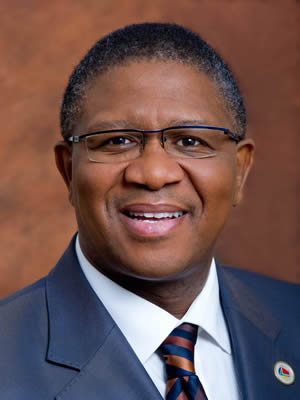 Minister Fikile Mbalula is the current Minister of Sports and Recreation in the country. He has been in charge of the Department of Sports and Recreation since May 2014.
Minister Fikile Mbalula is the current Minister of Sports and Recreation in the country. He has been in charge of the Department of Sports and Recreation since May 2014.
About the Minister
Minister Mbalula brings a lot of experience to his current portfolio. He has served as a Member of Parliament since 2009.
Prior to his appointment as Minister of Sports and Recreation, he served as Deputy Minister of Police from May 2009 to October 2010. Minister Mbalula is trained in Leadership Skills by the Careers Research and Information Centre, and as a Councillor by the Organisation for Appropriate Social Services in South Africa in psychotherapy.
About the Department
The Department of Sport and Recreation is responsible for sport in South Africa. Aligned with its vision of creating An Active and Winning Nation, its primary focus is to provide opportunities for all South Africans to participate in sport.
The department is also responsible for managing the regulatory framework and providing funding for different codes of sport.
All systems go for local government elections
All systems go for local government elections Joy
As the date for the Municipal Elections 2016 draws closer Cooperative Governance and Traditional Affairs Minister Des van Rooyen says the elections will be free and fair.
“It is all systems go. We don’t see any reason we should postpone the elections… Come 3 August, we will render another free, fair and very successful local government elections,” said Minister Van Rooyen.
Local government elections require that potential voters register in the ward in which they reside.
In the lead-up to the elections, government encouraged all eligible voters to register and verify their details on the voters’ roll.
Minister Van Rooyen said government is encouraged that South Africans registered in their numbers.
According to the Electoral Commission (IEC), the two voter registration weekends in March and April witnessed a total of
1 384 254 new voters being added to the voters’ roll, with 80 percent of them being under the age of 30.
This brought the total number of voters to
26 296 601 million or approximately 77 percent of the eligible voting population. Over 6.6 million voters visited their voting stations over the voter registration weekends.
“Government is pleased that South Africans took this opportunity to register, especially the first time voters and the youth,” he said.
Those who have still not registered for the elections can still visit the IEC offices in their local municipalities to update their details on the voters’ roll.
How to check your voting status
Voters can also check their status by dialing *120*432# or online: www.elections.org.za or call the Contact Centre on 0800 11 8000 between 7am and 9pm.
To register or to update registration and address details, voters must complete a REC1 voter registration application form and present it in person at the voting station for the voting district in which they ordinarily reside.
The form is also available online on: www.elections.org.za which voters can complete online, print a copy and bring it with them to their voting station.
Voters without formal addresses must complete and sign an affirmation form (REC AS) accompanying the REC 1 form in which they attest to the fact they live in the relevant voting district.
In municipal elections voters may only vote where they are registered and voters are reminded that it is a criminal offence to knowingly register in a voting district in which they are not ordinarily resident.
How to find your correct voting station
- Call the Contact Centre on 0800 11 8000 between 7am and 9pm
- Dial *120*432#
- Use the Voting Station Finder App on www.elections.org.za
All those visiting a voting station should have with them a valid South African ID ñ either a green bar-coded ID book, a smartcard ID or a valid Temporary Identity Certificate.
*Additional information from the Independent Electoral Commission
Apply Now Campaign rolled out to E Cape schools
Apply Now Campaign rolled out to E Cape schools Joy Deputy Minister of Higher Education and Training, Mduduzi Manana, has taken the 2016 Apply Now/Khetha Career Guidance Campaign to three schools in Lady Frere, in the Eastern Cape.
Deputy Minister of Higher Education and Training, Mduduzi Manana, has taken the 2016 Apply Now/Khetha Career Guidance Campaign to three schools in Lady Frere, in the Eastern Cape.
The Apply Now/Khetha Career Guidance Campaign is aimed at encouraging learners to apply on time for admission to tertiary institutions and prevent the long admissions queues that take place at the beginning of each academic year.
The campaign also seeks to inform learners about the career choices available within the Post-School Education and Training (PSET) sector.
The campaign runs from March to September across the country to help learners to make informed choices when applying to institutions of higher learning.
Learners are also informed about things to look out for when choosing their institutions of higher learning to avoid being conned into registering at bogus colleges that offer them unaccredited qualifications.
The Deputy Minister, who was accompanied by Mayor of eMalahleni Local Municipality Nomveliso Nyukwana, interacted with Grade 8 to 12 learners at Echibini Senior Secondary School, Nzimankulu Senior Secondary School and Mtirara Senior Secondary School.
“The best thing you can do this year as a Grade 12 learner is to start applying now for consideration in the institutions for higher learning for the 2017 academic calendar. You cannot be found wanting come January 2017,” Deputy Minister Manana told learners.
TVET Colleges
The Deputy Minister encouraged learners to consider Technical Vocational Education and Training (TVET) Colleges as an alternative to university education because the skills needs of the country demanded massive production of artisans from TVET colleges.
“This is by no means saying university education is not important, but we need more learners in the TVET system. Universities play a critical role in the production of knowledge,” he said.
100 Occupations in High Demand
The Deputy Minister also had a conversation with more than 2 000 learners from Grade 8 to 12 in the rural schools of Bergville and promoted the “100 Occupations in High Demand” list.
The list was released in 2014 by Higher Education and Training Minister, Blade Nzimande.
The Deputy Minister handed over charts of the list of occupations to the school principals of the three schools.
Learners were also informed about the National Student Financial Aid Scheme (NSFAS), which is aimed at assisting poor and academically deserving students to further their studies within the post-school sector.
NSFAS has to date helped more than
1.5 million beneficiaries, who have since joined the ranks of the black middle class.
Career Development Services
The Department of Higher Education and Training is currently running a Career Development Services Centre to assist learners with career advice.
Learners are encouraged to use their cell phones to reach the centre through SMS or a ìplease call meî on 072 204 5056 or 086 999 0123 or email careerhelp@dhet.gov.za or on Facebook at www.facebook.com/careerhelp or on Twitter at http://twitter.com/rsacareerhelp.
They can also access the website at www.careerhelp.org.za, the National Career Advice Portal at http://ncap.careerhelp.org.za or make use of the walk-in centre at 123 Francis Baard Street, Pretoria.
Developing SA's port infrastructure
Developing SA's port infrastructure nthabiGovernment is hard at work to develop new and refurbish existing infrastructure at ports.
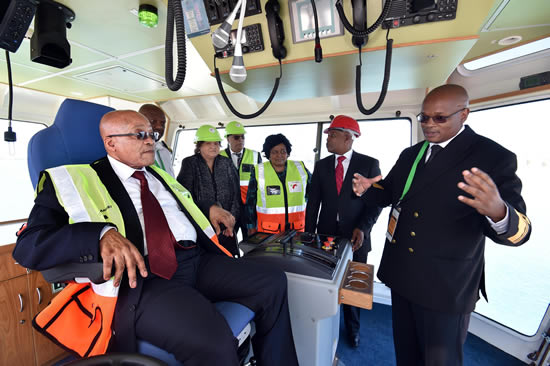 This is being done through the Transnet National Ports Authority (TNPA) with the aim of revitalising the oceans economy while creating opportunities for broader economic activity around the ports.
This is being done through the Transnet National Ports Authority (TNPA) with the aim of revitalising the oceans economy while creating opportunities for broader economic activity around the ports.
“Through this, opportunities are therefore created for the development of industrial clusters around the various ports across the country. These include boat building, boat and ship repairs, rig repairs, oil and gas, and aquaculture among others."
Public Enterprises Minister Lynne Brown was speaking during a presidential visit to the Port of Port Elizabeth recently.
“Transnet National Ports Authority has the responsibility of providing access to the land and ports infra-structure for the competing economic activities within the oceans economy.”
In the case of the Port Elizabeth, the intention was to create the boat building and boat repair industries and the composite cluster at the back of the port.
Eastern Cape Premier Phumulo Masualle noted that the province boasts 820 kilometres of the country' coastline and the ocean is key to the province’s economy.
“Infrastructure projects are beginning to bear fruit in our oceans and we are continuing to build and unlock the ocean economy,” Premier Masualle said.
He said through initiatives such as the Coega Development Cooperation as well as East London and Port Elizabeth Industrial Development Zones, the province would continue to take advantage of its oceans to bring about economic development.
Oceans economy creating jobs
 Minister Brown said South Africa’s eight commercial ports and numerous small ports have great potential to perform even better.
Minister Brown said South Africa’s eight commercial ports and numerous small ports have great potential to perform even better.
Up to R7 billion has been committed towards new port facilities and refurbishments and already 200 jobs have been created already.
“I have approved the model that Transnet will fund and operate five initiatives and seek private sector participation for the new facilities in Saldanha, Richards Bay and East London,” said Minister Brown.
Donating an organ can save a life
Donating an organ can save a life nthabiMosa Mphore says it’s high time South Africans move away from negative misconceptions about donating organs.
 “People say donating organs is wrong. That it goes against religious and cultural practices. They forget that if you give consent for your organs to be donated you are giving another person a second chance at life,” said Mphore.
“People say donating organs is wrong. That it goes against religious and cultural practices. They forget that if you give consent for your organs to be donated you are giving another person a second chance at life,” said Mphore.
Mphore was speaking to Vuk’uzenzele from his home in Soweto, Johannesburg. He is living testimony of of how donating organs can give other people a second chance at life.
Fighting to stay alive
In 2011 Mphore’s life took a drastic change when he fell ill and found himself in hospital fighting for his life.
“I remember this nightmare like it happened only yesterday. It was a very confusing period for me when I got sick. I would be out and about feeling fine one minute and start feeling extremely nauseous and out of energy the next.
“I constantly had stomach cramps and was vomiting all the time, unable to hold anything down. This was a huge shock for me as a young man living a considerably healthy lifestyle and taking part in lots of activities, such as running and playing tennis.”
He went to see his doctor who discovered that his blood pressure was too high for his age and they suspected kidney failure.
“Doctors took urine samples which showed high protein content. My kidneys were no longer filtering proteins and toxins. It was confirmed at Chris Hani Baragwanath hospital that I had end-stage kidney failure.”
“The doctors explained to me that this condition was caused by hypertension which was due to my family history of suffering from this chronic illness.”
Mphore said that the doctors told him that he was lucky to be alive.
“I stayed in hospital for three months and was immediately placed on haemodialysis treatment.”
In haemodialysis, a machine filters wastes, salts and fluid from the blood when the kidneys are no longer healthy enough to do this work sufficiently.
Haemodialysis is the most common way to treat advanced kidney failure.
According to the Department of Health haemodialysis is offered in different government hospitals around the country, namely the Northern Cape Kimberley Hospital (Northern Cape), Klerksdorp Hospital, Job Shimankane Tibane Hospital and Mafikeng Provincial Hospital (both in North West), Universitas Hospital (Free State), Livingstone Hospital and Frere Hospital in the Eastern Cape, Tygerberg hospital (Western Cape), Red Cross War Memorial Children’s Hospital and Groote Schuur Hospital.
In KwaZulu-Natal Inkosi Albert Luthuli Hospital offers haemodialysis, while the treatment is offered in Gauteng at the Charlotte Maxeke, George Mukhari and Steve Biko Academic hospitals.
In Mpumalanga, Rob Ferreira and Witbank Hospital offer Haemodialysis.
Mphore said that life was never the same for him as he was constantly ill and in and out of hospital.
“This continued until I started dialysis at home which was not a good experience either, especially when I had to be hooked up to a machine every four hours for treatment.”
“I was placed on a waiting list for a kidney donation. I could feel my life slowly drifting away and my friends distancing themselves. At least I had the support of my family, a few close friends and my girlfriend.”
In 2013 Mphore said he underwent a kidney transplant.
“It took me three months to recover after surgery. Because of what I went through, I have decided to dedicate my life to raising awareness about organ donation by telling my story and teaching people about chronic illnesses.”
Open-Eye Foundation
While in hospital, Mphore made a pledge to save at least one other person from this ordeal and educate the community about kidney diseases.
“I established the Open-Eye Foundation, a public health and awareness non-profit organisation which educates the public on acute and chronic illnesses and the life-saving benefits of organ donation.”
He adds that life has been filled with ups and downs but he is grateful to have been given a second chance, which made him dedicate his life to informing others.
For more information on organ donation, visit www.odf.org.za or call the toll-free number on 0800 22 66 11.
Elections are about achieving a better SA
Elections are about achieving a better SA JoySouth Africans are spoilt for choice and opportunity when it comes to choosing leadership.
We are given the opportunity to vote every two-and-a-half years, with local elections and national elections more or less 30 months apart.
These are vital opportunities for all South Africans over the age of 18 to exercise their democratic rights as voters and examine what they really believe in and stand for as citizens – and how the political parties bidding for their votes match citizens’ values and expectations.
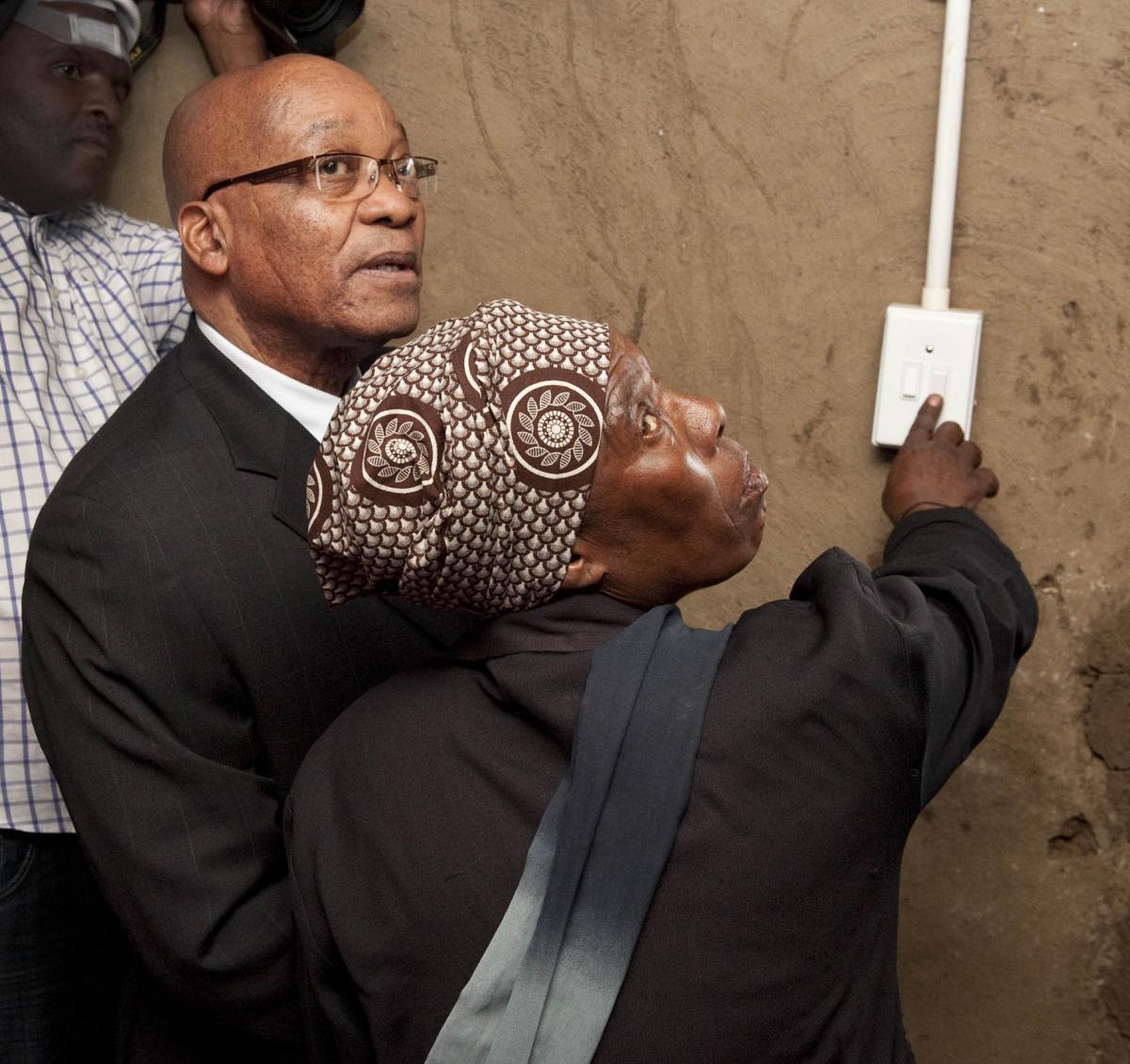 On Wednesday 3 August, millions of South Africans will once again make their way to thousands of voting stations in all corners of the country to say which candidate should represent them on their metropolitan, city, town or district councils, and to say which political party should represent their interests.
On Wednesday 3 August, millions of South Africans will once again make their way to thousands of voting stations in all corners of the country to say which candidate should represent them on their metropolitan, city, town or district councils, and to say which political party should represent their interests.
The responsibility of making local government and local services a success rests as much on the voter as it does on the elected candidate.
Councillors standing for office in 2016 must put the interests of citizens first to build on the record of moving South Africa forward that has been established by the ANC-led government since 1994.
Between 2001 and 2014, the percentage of households with access to piped water increased from 61 percent in 2001 to 90 percent in 2014.
Households receiving free basic water services increased from seven million to 11 million in 2013, thus improving the quality of life of many, especially women in rural areas.
Giving dignity to millions of South Africans, government increased access to basic sanitation services from over 62 percent to 79 percent between 2002 and 2014.
More than 55 percent of households had access to refuse removal and collection in 2001, and the figure had increased to 64 percent by 2014.
The percentage of households that are connected to electricity supply has increased from about 70 percent in 2001 to 86 percent in 2014. This amounted to more than five million households.
Figures also show that more than two million households who are extremely poor, were exempted from paying for electricity by 2014 through the indigent programmes.
The August local government elections is a platform for South Africans to decide how to move South Africa forward in terms of services such as water, electricity, sanitation, waste management, drainage and other features of our daily lives.
As voters we should therefore make our choices based on candidates’ ideas and plans for improving our lives, rather than on what they look like, what they wear or how clever they are with words.
The local administrations that will be elected in August must deepen the work undertaken by national government since 2014 to move South Africa forward.
Contrary to what many voices around our country are suggesting, August is not about replacing the democratically elected government that voters put in place in 2014.
August 2016 is about putting in place local administrations that will be innovative, responsive and accountable in improving the quality of life in the places where we live and work.
August 2016 is about putting in place directly elected representatives who will work with residents and with community-based organisations to create a better life and to address difficulties promptly and in partnership with communities.
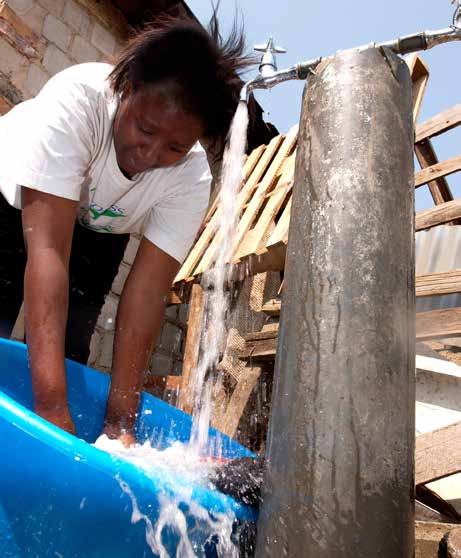 August 2016 is about bringing to an end the lawlessness and destructive behaviour that sadly affect many communities around the country where consultation and partnership is absent between voters and the people who represent them.
August 2016 is about bringing to an end the lawlessness and destructive behaviour that sadly affect many communities around the country where consultation and partnership is absent between voters and the people who represent them.
August 2016 is about achieving a better South Africa through a better Johannesburg, a better Jacobsdal and a better Jozini.
August 2016 is about ensuring that clean streets, functioning traffic lights, unblocked drains and functional primary health care centres reflect the energy of our community leaders and the support of residents.
The responsibility rests on all of us to make our local areas work. While we expect councillors, who choose to stand for public office, to do their work, we must also commit to keep our end of the bargain.
We must be active participants in the meetings and deliberations of our councils; we must offer our views on projects and plans when we are invited to give public comment; we must make suggestions and share ideas that will move our communities forward, and we must, within reason, be fair and accommodating when there are difficulties.
We must pay for services we receive; we must report vandals; we must treat our municipal services and infrastructure as if they are our own assets – because they are.
This spirit of building a better South Africa must also be part of how we approach the elections themselves.
We must give all contestants in the election a fair chance to present their case. We can be firm in our views without being intolerant or violent.
We must respect the rights of all registered political parties to put their case in all parts of our country and all parts of our communities.
There are no no-go areas for any political party.
We must defend our proud record of free and fair elections, and we must ultimately ensure that once we leave the voting booth on 3 August, South Africa is a better place for all of us.
Government delivers 4.3 million homes
Government delivers 4.3 million homes Estelle GreeffGovernment has, since 1994, worked hard to ensure that South Africans have a decent place to call home.
Human Settlements Minister Lindiwe Sisulu has launched a national campaign to celebrate 4.3 million houses and housing opportunities being delivered since the dawn of democracy.
The campaign celebrates an achievement that has seen more than 20 million people getting a roof over their heads. The launch was held at Cosmo City Multipurpose Complex in Johannesburg recently.
It coincided with the 10th anniversary of the Cosmo City Integrated Mixed Development Programme, which has resulted in the completion of 12 500 mixed income houses and 70 000 families moving into the area.
Cosmo City has all the elements of inclusive housing namely, schools, clinic, shopping mall, library and a fire station that is currently under construction, with its completion expected in December this year.
Minister Sisulu was accompanied by Gauteng Human Settlements, MEC Paul Mashatile who visited a number of projects in the area.
Giving South Africans a place to call home
Minister Sisulu said the delivery of 4.3 million houses and housing opportunities is a real milestone in a country where there is great need. She said this is in keeping with the promise of the Freedom Charter to provide housing for the people.
“Today is a celebration of investing in our commitment to construct a different future. It is also a celebration of the collaboration between government, the private sector and banks,” said Minister Sisulu.
While acknowledging that there have been difficult times in the housing sector, which are likely to persist, Minister Sisulu said she is confident things would turn around.
“Nothing is more gratifying than for all of us here today to see our dreams so wonderfully matured, especially at a time when the clouds of economic gloom hover above our heads with remarkable obstinacy. It is perhaps fitting that we remind ourselves of the many wonderful things taking place in our beautiful country.”
Inclusive housing
She said they chose Cosmo City to launch the celebration campaign because it is the most advanced in the department’s projects and it has all the elements of inclusive housing that they want to see.
“Cosmo City is a representative of what the human settlements should be,” said Minister Sisulu.
Cosmo City is part of a range of initiatives the department has undertaken since 2004. Other projects include the N2 Gateway housing project in Cape Town and Cornubia in Durban.
The breakdown of the 4.3 million housing opportunities includes 2.8 million RDP and BNG [Breaking New Ground] houses, 986 000 serviced sites, 360 000 Enhanced Extended Discount Benefit Scheme, 68 640 Community Residential Units, 121 000 social housing and 6 000 finance linked houses.
Cosmo City resident Sphiwe Dela thanked government for making sure that people live in decent houses.
“It’s important to celebrate this achievement and also understand where you come from as a community.”
Cosmo City ward 100 councillor P Maisha said: “To us, this is a historic event. Cosmo City is a promised land in so many respects and we are the direct beneficiaries of new democracy.”
MEC Mashatile said Cosmo City is a good model of a human settlement, where people with varying income can all live.
“It’s good to see the journey that has been travelled. It’s not only government coming in with subsidy money but the private sector is also coming in because they build the bond houses and shopping malls. This is what we are going to be doing all over the country,” said MEC Mashatile.
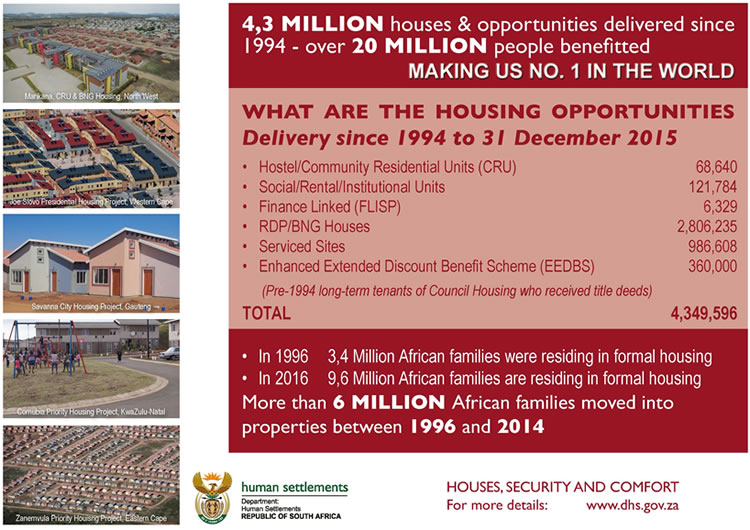
Govt launches online ID application
Govt launches online ID application JoyThe Department of Home Affairs has made it more convenient for people to apply for smart card IDs and passports.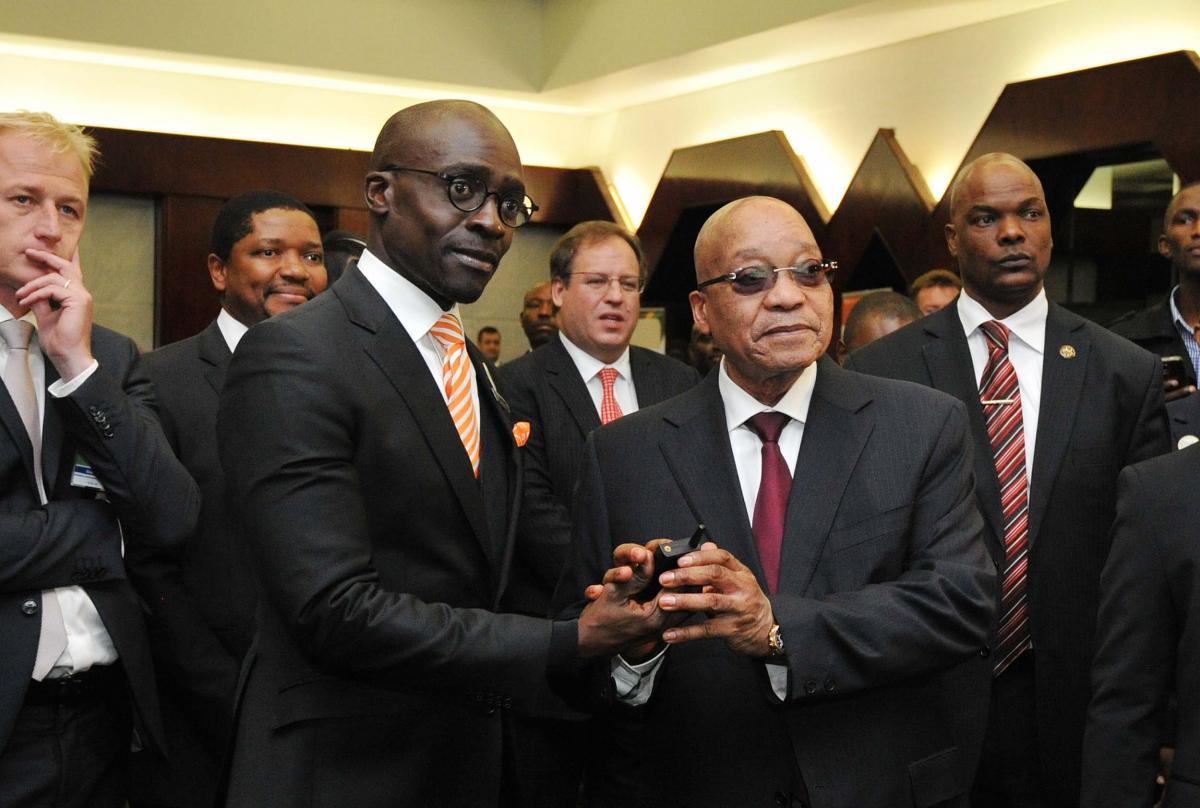
People living in Gauteng and Cape Town no longer have to queue to apply for their documents but can now apply online and collect them from their banks at a specified date.
The department has partnered with the country’s four major banks namely: Absa, FNB, Standard Bank and Nedbank, to make the concept of e-Home Affairs a reality.
The system aims to reduce long queues at the 140 offices throughout the country and make the department’s services more readily accessible.
Home Affairs Minister Malusi Gigaba said South Africa is the first country to implement such a system.
E-Home Affairs
e-Home Affairs allows people who are aged 30 to 35 years old to apply for their smart ID’s and passports, upload supporting documents and pay for their applications online. They can also make an appointment with their selected banks to have their photos taken and fingerprints verified.
Shortly thereafter, an SMS will be sent to the applicant stating when they can collect their documents. The cost for the smart card ID is R140 and R400 for a passport.
More than 4 000 people have registered through the portal so far.
Speaking during the launch of the system, President Jacob Zuma said he was pleased with the improved security measures Home Affairs was putting in place. He said the introduction of the smart ID card in 2013 to replace the current green barcoded ID book was a milestone.
“We are happy indeed that the banks have teamed up with the Department of Home Affairs. This department is central to the lives of our people and all others residing in our country,” he said.
President Zuma called on the private sector to support the department as much as possible.
Getting more banks involved
Meanwhile Minister Gigaba said his department will get other banks to come on board.
“We are trying to expand our footprint and make it convenient for people to apply for their documents.
“The entire process is paperless and digitised and there is no human intervention along the line.
“You can trust that when your smart ID card is issued to you, the only time a human being has touched it is when it is being transported by an envelope from where the card was printed to the office where you are going to collect it,” said Minister Gigaba.
Improving services
Home Affairs Director-General Mkhuseli Apleni said the system also aims to improve professionalism within the department.
“Corruption was rife and the identities of people were stolen and constantly under threat.
“Our department was associated with long queues and endless hours spent waiting for services and this forced us to move with the times and fall in line with the tech savvy trends of the world.
“The beauty of the system is that citizens who choose this facility do not have to queue in offices, meaning Home Affairs offices would then be freed up to attend speedily to other clients who can’t make use of the system,” said Apleni.
Roodepoort, west of Johannesburg, resident Lungile Maseko told Vuk’uzenzele she was happy about the new system.
“I’m glad that government is always finding ways to improve service delivery.
“Although I can’t use the portal owing to the fact that I don’t qualify because of my age, I must admit the system is great. It will certainly eradicate corruption and people will no longer have to take time off work to sort out an ID or passport,” said Maseko.
The Department is confident that the programme will eventually be rolled out throughout the country and will result in people also going to these facilities to obtain birth and death certificates.
Bank branches already on the system
ABSA
- ABSA Lifestyle Centre, Centurion.
- ABSA Towers North, Johannesburg.
- ABSA Ghandi Square, Johannesburg.
FNB
- FNB Menlyn, Pretoria.
- FNB Merchant Place, Rivonia, Johannesburg.
- FNB, Lifestyle Centre, Centurion
STANDARD BANK
- Standard Bank, Killarney, Rosebank.
- Standard Bank, Canal Walk, Cape Town.
NEDBANK
- Nedbank, Rivonia, Johannesburg.
- Nedbank, Lakeview, Roodepoort.
Internships: Department of Military Veterans 2016/17
Internships: Department of Military Veterans 2016/17 Estelle GreeffLabour Relations Interns X2 (Directorate: Human Resources Management)
Reference number: DMV 12/04/2016
Monthly stipend: R5 000.00
Requirements: Appropriate 3year degree/diploma in the discipline for which application is made between 18 and 35 years of age Communication skills (verbal and written). Discipline/Area Business Management. Note: Candidates who have already participated in an Internship Programme in any Government Department will not be considered.
Key performance areas/Duties: The candidate must be able to presents employee’s position in contract negotiations, grievance arbitrations, and unfair labour practice hearings, compiles information and statistics on the economic proposals of both labour and management. Participates in meetings between labour and management to discuss and attempt to resolve issues of mutual concern, serves as resource for management training programs in labour relations. Maintains records, prepares reports and composes correspondence relative to the work and performs related work as assigned by the supervisor/manager.
Administrative Assistant Interns: (Office of the Chief Financial Officer & of the Director: Finance)
Reference number: DMV 13/04/2016
Monthly stipend: R5 000.00
Requirements: A diploma or Degree in Office Management, Public administration or equivalent qualification, knowledge of clerical or senior clerical level or as an intern in a relevant office. Provide secretariat support services by typing documents, take minutes during meetings. Compile and distribute agendas and minutes. Circulate and collect attendance registers during meetings. Receive and reroute incoming calls. Record and relate massages. Operate and ensure that office equipment is in good working order. Coordinate and schedule meetings. Coordinate the provision of refreshments and water during meetings. Follow-up with the supervisor regarding scheduled meetings and appointments. Manage the cancellation and rescheduling of appointments. Provide records management and filing services Ensure the effective flow of information to and from the office. Receive and register incoming correspondence. File and safe keep documents in line with the file plan and other relevant regulations and practice. Register and distribute outgoing correspondence. Maintain the confidentiality of documents. Receive clients and visitors. Receive and seat visitors. Provide refreshments to clients and visitors where necessary. Respond to general enquiries of visitors. Manage the tidiness of the office. Provide administrative and logistical support services Order stationary for the office, serve as a chief user clerk and coordinate the procurement of Office supplies, computer consumables and stationary for the office. Check invoices for correctness and certify them for payment. Coordinate the payment of invoices. Make bookings for venues, accommodation and manage travel arrangements. Ensure the processing of S&T and overtime. Collate and compile reports and any other information as requested. Obtain the necessary signatures on documents. Scrutinise documents to determine actions. Manage the leave register and the submission of leave forms for the office. Monitor budget spending for the office in order to note under and over utilisation. Collect and coordinate all documents that relate to the budget and funding requirements. Shortlisted candidates will be required to complete practical assessment.
Financial Accounting Management Interns X5 (Chief Directorate: Financial Management)
Reference number: DMV 14/04/2016
Monthly stipend: R5 000.00
Requirements: A diploma or Degree in Financial Accounting, or equivalent qualification, knowledge of clerical or senior clerical level or as an intern in a relevant office. Provide clerical support in the administration of financial accounting management services by: Supporting the administration of financial transactions in line with financial regulations and prescripts, provide clerical support in the verification and authenticity of payment vouchers. Provide support in the verification of supplier statements against commitments and disbursements reports. Administer payment of suppliers within the set time frame. File and safe keep payment and other related documents. Provide support in the collection and analysis of financial data and reporting thereof. Assist in the reconciliation of invoices and statements. Provide support in the development and the maintenance of income and financial statements of the association and keep records thereof. Provide support in the Administration of personnel payments. Assist in verifying the completeness of procurement documents and ensure that relevant signatures are appended.
Administrative Assistant Interns X2 (Directorate: Office of the Director-General)
Reference number :DMV 15/04/2016
Monthly stipend: R5 000.00
Requirements: A diploma or Degree in Office Management, Public administration or equivalent qualification, 2 to 3 years’ experience at clerical or senior clerical level or as an intern in a relevant office. Provide secretariat support services by typing documents, take minutes during meetings. Compile and distribute agendas and minutes. Circulate and collect attendance registers during meetings. Receive and re-route incoming calls. Record and relate messages. Operate and ensure that office equipment is in good working order. Coordinate and schedule meetings. Coordinate the provision of refreshments and water during meetings. Follow-up with the supervisor regarding scheduled meetings and appointments. Manage the cancellation and rescheduling of appointments. Provide records management and filing servicesEnsure the effective flow of information to and from the office. Receive and register incoming correspondence. File and safe keep documents in line with the file plan and other relevant regulations and practice. Register and distribute outgoing correspondence. Maintain the confidentiality of documents. Receive clients and visitors. Receive and seat visitors. Provide refreshments to clients and visitors where necessary. Respond to general enquiries of visitors. Manage the tidiness of the office. Provide administrative and logistical support services. Order stationary for the office, serve as a chief user clerk and coordinate the procurement of Office supplies, computer consumables and stationary for the office. Check invoices for correctness and certify them for payment. Co-ordinate the payment of invoices. Make bookings for venues, accommodation and manage travel arrangements. Ensure the processing of S&T and overtime. Collate and compile reports and any other information as requested. Obtain the necessary signatures on documents. Scrutinise documents to determine actions. Manage the leave register and the submission of leave forms for the office. Monitor budget spending for the office in order to note under and over utilisation. Collect and coordinate all documents that relate to the budget and funding requirements.
Directions to candidates: The suitable candidates will be selected with the intention of promoting representivity and achieving affirmative action targets, as contemplated in the relevant components Employment Equity Plan. The Department reserves the right not to appoint any applicants to these positions and to conduct pre-employment security screening.
PERSONS WITH DISABILITIES ARE ENCOURAGED TO APPLY
NB: PREFERENCE WILL BE GIVEN TO MILITARY VETERANS
Applications must be submitted on form Z83, obtainable from any Public Service Department, and should be accompanied by comprehensive Curriculum Vitae (previous experience must be comprehensively detailed) and certified copies of qualifications, service certificates, driver’s license and Identification Document. Applicants with foreign qualification must be submitting a SAQA evaluation report on the qualification. Non-SA citizens must attach a certified copy of proof of permanent residence in South Africa. In addition to completing the Z83, applicants are required to disclose any pending criminal, disciplinary or any other adverse allegation or investigation against them. Applicants must also provide the full names, address and telephone numbers of at least 3 references. Failure to submit the requested documents may results in your application not being considered (applications lacking evidence of relevant experience will not be considered). If you apply for more than one post in the Department, please submit a separate application form for each post. Applicants will be expected to be available for selection interviews at a time, date and place determined by the Department. If you have not been contacted for an interview within three (3) months of the closing date, please assume that your application was not successful. Kindly note that a security clearance and verification of qualification by SAQA will be conducted to successful shortlisted candidates. Kindly note that Matric qualification is a pre-requisite to all advertised posts. Correspondence will be entered into with short-listed candidates only.
Unless otherwise stated, please forward applications, quoting the relevant reference number, to The Director-General, Department of Military Veterans, Private Bag X943, Pretoria, 0001 or may be hand delivered at corner 328 Festival & Arcadia Streets, Hatfield, Pretoria, 0001. All enquiries should be directed to: Ms Charmaine Twala at (012) 765 9442 or Mr Caiphus Mailula (012) 765 9355, Closing date: 9 May 2016. Applications received after the closing date will not be considered.
Ithala helps businesses grow
Ithala helps businesses grow JoyMore than five businesses in KwaZulu-Natal (KZN) walked away with R50 000 in prize money and an additional R5 000 to contribute towards a charity of their choice at the Ithala Business Achiever Awards held in Durban recently.
The Ithala Business Achiever Awards recognise Ithala clients’ business success and acknowledges their contribution towards developing an entrepreneurial province.
Speaking at the award ceremony, Ithala Acting Business Finance Executive Mano Muthusamy said over the past years, more than 500 enterprises have been assisted by Ithala.
“Given the growing inequalities in employment, income and education, Ithala believes SMMEs can be influential in making a profound impact on the country’s economy by creating jobs.
“As part of Ithala’s developmental mandate, the agency makes funding available to enterprises that are viable, sustainable and have the potential to stimulate economic growth and job creation,” he said.
He said Ithala has a number of SMME development initiatives.
“We have the Siyasebenza development initiative, which comprises a series of developmental outreach programmes to uplift youth, women and SMMEs in townships and rural areas. We also have the Inkunz’isematholeni Youth in Business programme, which was launched in 2014 to encourage South Africa’s youth to consider self-employment as a job option. The programme is aimed at promoting entrepreneurship and providing skills development among the youth.
“Ithala’s Business Achiever Awards aim to celebrate our clients’ successes by rewarding, showcasing and sharing their accomplishments with other aspirant business owners to inspire them towards growth and success,” said Muthusamy.
The Business Achiever nominees were evaluated based on their entrepreneurial spirit, financial performance, strategic direction, community impact, innovation and personal integrity. Awardees were celebrated across various industry sectors including agriculture, logistics, trade and services and commercial property as well as a special award category for excellence.
Ithala 2016 winners
Agriculture Business of the Year
Bagging the Agriculture Business of the Year award was Lucky Khumalo of Mgodeni Farm, a family-owned business in Dannhauser, Newcastle, which farms over 1 000 hectares of maize, 180 cattle and over 80 pigs. Khumalo said his farm supplies local farmers with cattle and also sells to the market. He has 15 permanent employees and hires more than 30 casuals during planting and harvesting.
Trade and Service Business of the Year
Ntobethuthu Trading was named Trade and Service Business of the Year. Peggy Ndhlovu is the owner of a flourishing BP service station in Umlazi V section. She has 12 permanent employees.
Logistics Business of the Year
The Logistics Business of the Year award went to Eric Sokhulu of Asphiwamandla Trading Enterprise, a logistics service provider operating in Mtubatuba and Jozini, which specialises in sugar cane, coal and timber haulage.
Commercial Property Business
Sastri Ramiah, CEO of Olive Group, which provides an array of services including conferencing and events, accounting services, property and food and beverages scooped the Commercial Property Business of the Year award.
Special category for excellence
The special category award for excellence was presented to husband and wife team Mike and Thina Maziya. They own Super Mama Plastics and Verigreen, which specialises in disposable plastic manufacturing and commercial property.
Jobs: Department of Military Veterans
Jobs: Department of Military Veterans Estelle GreeffNB: Kindly note that preference will be given to military veterans. The Department of Military Veterans is an equal opportunity affirmative action employer. It is our intention to promote representivity (race, gender and disability) through the filling of these posts and candidates whose appointment/promotion/transfer will promote representivity will receive preference.
Chief Director: Military Veterans’ Heritage, Memorial, Burials and Honours
Reference number: DMV 01/04/2016
Salary/Package: R1 042 500 pa (Level 14)
Requirements: An appropriate Bachelor’s Degree/National Diploma or equivalent and 6-10 years appropriate working experience in senior management position with proven managerial skills. Must be a strategic thinker with good leadership skills, intuitive thinker, good team player, incisive and decisive, empathetic, personal drive, firm and fair and have Policy analysis skills. A good knowledge of Public Service Act, Public Service Regulations, Basic Conditions of Employment Act, Labour Relations Act and other employment legislations. Good office management skills, good organisational skills, good inter-personal relations, coordination skills and be able to work independently.
Key Performance Areas/Duties: Manage Military Veterans’ heritage, memorial and honours services. Identify and develop military veterans’ heritage, memorial and honour policies, processes, strategies and procedures as well as ensuring the successful implementation thereof and advice management and the department on policy matters with specific reference to military veterans’ heritage, memorial and honour policies. Review processes and procedures developed and interrogate their efficiency and effectiveness. Conduct research and impact analysis pertaining to exhumation and repatriation in line with the government policies and international guidelines and keep track of new developments and advice the Department. Manage burial support services, identify and maintain military veterans’ cemeteries. Manage the recognition and honoring of military veterans in their life and in memorial. Represent the Department in with various Fora meetings (nationally and provincially). Manage, coordinate and market military veterans’ heritage, memorial and honour events, projects and campaigns and the department’s program of action by conceptualizing and coordinating Military Veterans’ heritage, memorial and honour events. Monitor and analyse all events on military veterans’ heritage, memorial and honour as well as planning and organizing conferences. Liaise and co-ordinate with governmental, non-governmental institution and other structures and organizations. Ensure external funding for military veterans, departmental and Ministerial activities by engaging donor, companies and private sector role-players.315 1111 Private Bag X81, Pretoria, 0001
Chief Director: Military Veterans Beneficiary Support
Reference number: DMV 02/04/2016
Salary/Package: R1 042 500 p.a (Level 14)
Requirements: An appropriate Bachelor’s Degree/National Diploma or equivalent. 6 to 10 years appropriate working experience in senior management position with proven managerial skills. Thorough understanding of Public Service Must be a strategic thinker with good leadership skills, intuitive thinker, good team player, incisive and decisive, empathetic, personal drive, firm and fair and have Policy analysis skills. A good knowledge of Public Service Act, Public Service Regulations, Basic Conditions of Employment Act, Labour Relations Act and other employment legislations. Good office management skills, good organisational skills, good inter-personal relations, coordination skills and be able to work independently.
Key Performance Areas/Duties: manage, coordinate and facilitate military veterans’ beneficiary services. Develop and monitor the implementation of legislative framework pertaining to military veterans’ beneficiary support services. Manage the development and implementation of military veterans transiting, registration and eligibility and verification. Conduct assessments and identify bottlenecks in terms of beneficiary services and compile relevant report. Facilitate the provision of dispute resolution when the need arise. Ensure proper management of military veteran programmes. Manage military veteran database and benefits information. Develop and maintain military veterans’ and beneficiary database. Ensure integrity and security of database information. Manage the transition for military veterans from active service to civilian service. Ensure deregistration of military veterans and registration of beneficiaries and dependents and conduct verification processes and advice the department on legibility and benefits. Develop partnerships and network with relevant stakeholders. Establish and maintain good relations within the department, NGO’s and all stakeholders. Liaise and co-ordinate with governmental, non-governmental institutions and other structures and organizations. Represent the department in with various FORA meetings (nationally and provincially). Manage resources (physical, human and financial) ensure proper implementation of the budget by monitoring, projecting & reporting expenditure. Monitor and report on the utilisation of equipment. Evaluate and monitor performance and appraisal of employees. ensure capacity and development of staff. Enhance and maintain employee motivation and cultivate a culture of performance management.
Director: Heritage, Memorial, Burials and Honours
Reference number: DMV 03/04/2016
Salary/Package: R864 177 p.a (Level 13)
Requirements: An appropriate Bachelor’s degree/National Diploma or equivalent qualification, 5 years relevant managerial experience, insight into prescripts, which impact on the administration of Military Veterans affairs thorough understanding of policy analysis, formulation and interpretation and understanding of Public Service Regulatory Framework.
Key Performance/Duties: Co-ordinate and provide technical support on the implementation of Military Veterans heritage, memorials, burials and honor policies, regulations, practices and procedures. Develop strategies and plans on the monitoring and reviewing of Military Veterans Heritage, Memorials, Burials and Honour policies and plans. Manage and analyse data on Military Veterans Health Heritage, Memorials, Burials and Honour information for reporting purposes and produce reports thereof. Advice department on appropriate policies, strategies, programs, projects, processes and procedures with respect to Military Veterans Heritage, Memorials, Burials and Honour services. Coordinate and ensure compliance with departmental prescripts in all matters concerning Military Veterans heritage, memorials, and honour services. Report on strategic frameworks in the area of functional responsibility. Monitor performance with respect to Military Veterans Heritage, Memorials, Burials and Honour services as per departmental policies. Participate in the development of operational plans of the Chief Directorate. Manage and co-ordinate memorials, honour and burials support services. Identify and ensure, where and when required, that military veterans burial sites are maintained ito departmental policies and in partnership with local authorities. Facilitate support services to families in connection with burials, re-burials and exhumations. Manage the provision of honour services to surviving military veterans. Manage the provision of posthumous honours to fallen military veterans. Develop partnerships and network with relevant stakeholders. Establish and maintain good relations within NGO’s and all stakeholders. Liaise and co-ordinate military veterans activities with governmental, non-governmental institutions and other structures and organizations. Represent the department in various meetings involving military veterans affairs Manage resources (physical, human and financial). Ensure proper implementation of the budget by monitoring, projecting & reporting expenditure. Monitor and report on the utilisation of equipment. Evaluate and monitor performance and appraisal of employees. Ensure capacity and development of staff. Enhance and maintain employee motivation and cultivate a culture of performance management.3
Director: Military Veterans Beneficiary Support
Reference number: DMV 04/04/2016
Salary/Package: R864 177 p.a (Level 13)
Requirements: An appropriate Bachelor’s degree/National Diploma or equivalent qualification, 3 years relevant managerial experience, Insight into prescripts, which impact on the administration of Military Veterans affairs, Thorough understanding of policy analysis, formulation and interpretation and understanding of Public Service Regulatory Prescripts.
Key Performance Areas/Duties: Develop and facilitate the implementation of military veterans beneficiary support policies, regulations, practices and procedures. Develop, monitor and review Military Veterans Beneficiary Support strategies, policies and plans. Manage and analyse data on Military Veterans benefits and support services for reporting purposes and produce reports thereof. Coordinate and ensure compliance with the requirements for the implementation of Military Veterans benefits and support legislations, policies, strategies, programs, projects, processes and procedures. Report on strategic frameworks in the area of functional responsibility. Manage the development of operational plans of the Directorate Coordinate and facilitate the granting of military veterans benefits and support services. Oversee the determination of eligibility, registration and verification processes. Conduct assessments and identify service delivery bottlenecks in the area of Military Veterans benefits and services and compile relevant reports. Facilitate the provision of dispute resolution when the need arise. Ensure proper management of military veteran programmes. Participate in the management of military veterans database and benefits information. Oversee the development and management of national military veterans’ database. Manage and ensure linkages with provincial sources of information and ensure data integrity and security. Ensure categorization of the type of information to be made available to the public. Ensure that all relevant information is available for addition to the Government website. Develop strategies for awareness campaigns and conduct periodic information sessions.Facilitate the transition of military veterans from active service to civilian life. Manage registration and deregistration processes in respect of military veterans and advice the department on legibility and benefits. Develop partnerships and network with relevant stakeholders. Establish and maintain good relations within the department, NGO’s and all stakeholders. Liaise and co-ordinate with governmental, non-governmental institutions and other structures and organizations. Represent the department in various meetings. Manage resources (physical, human and financial). Ensure proper implementation of the budget by monitoring, projecting & reporting expenditure. Monitor and report on the utilisation of equipment. Evaluate and monitor performance and appraisal of employees. Ensure capacity and development of staff. Enhance and maintain employee motivation and cultivate a culture of performance management.
Director: Socio-Economic Programme
Reference number: DMV 05/04/2016
Salary/Package: R864 177 p.a (Level 13)
Requirements: An appropriate Bachelor’s degree/National Diploma or equivalent qualification, 3 years relevant managerial experience, Insight into legislation, which impacts on the administration of Military Veterans affairs, tthorough understanding of policy analysis, formulation and interpretation and understanding of Public Service Regulatory Prescripts.
Key Performance/Duties: Manage and give technical support on the implementation of military veterans socio-economic support policies, regulations, practices and procedures. Develop, monitor and review Military Veterans Socio-Economic support strategies, policies and plans. Manage Military Veterans Socio-Economic information for reporting purposes and produce reports thereof. Oversee Military Veterans Socio-Economic programmes and related projects. Report on strategic frameworks in the area of functional responsibility. Monitor the implementation of Military Veterans Socio-Economic support according to departmental objectives. Participate in the development of operational plans of the Chief Directorate. Participate in the preparation of service level agreements and ensure implementation thereof. Determine possible future need for service by conducting a gap analysis. Identify line function departments and other services providers. Design and maintain analytical reports beneficial to the department. Participate and monitor contract drafting and prepare bids and proposals where necessary. Implement and monitor service level agreements. Establish and maintain a database of all stakeholders/clients. Develop, monitor and evaluate the referral, service delivery protocols and systems and ensure compliance. Ensure quality reporting on sourcing of goods and services. Consolidate procurement plan based on inputs from various stakeholders. Develop partnerships and network with relevant stakeholders.Establish and maintain good relations within the department, NGO’s and all stakeholders. Liaise and co-ordinate with governmental, non-governmental institutions and other structures and organizations on benefits and access. Represent the department in various meetings. Manage resources (physical, human and financial). Ensure proper implementation of the budget by monitoring, projecting & reporting expenditure. Monitor and report on the utilisation of equipment. Evaluate and monitor performance and appraisal of employees. Ensure capacity and development of staff. Enhance and maintain employee motivation and cultivate a culture of performance management.
Assistant Director: Labour Relations Officer: Human Resources Management
Reference number: DMV 06/04/2016
Salary/Package: R289 761 p.a (Level 9)
Requirements: An appropriate Bachelor’s degree/Na¬tional Diploma in Labour Relation or equivalent qualification with 3 to 5 years relevant first level managerial experience in Labour Relations. Certificates in Conciliation/Arbitration/Negotiations and experience in Labour relations will be an advantage. Knowledge of the Public Service Act, 1994, PFMA, Public Service Regulations & Instructions, Labour Relations Act, 66 of 1995 and the Individual Grievance Regulations. Computer literacy (MS Office), Communication- (written and verbal), Strategic and analytic thinking-, inter personal relations- and problem solving and decision making skills. Ability to interpret and apply policy, and be able to work under pressure and independently
Key Performance/Duties: To develop, interpret and ensure correct implementation of Labour Relations and Employee Health and Wellness strategies, policies, procedures and practices. Conduct investigations on all alleged misconduct cases. Manage employer-employee relations by ensuring that appropriate corrective measures are implemented. Manage and monitor industrial actions (strikes/lockouts, picketing and protest action). Manage and monitor the employee wellness program. Develop partnerships and network with relevant stakeholders. Manage and control the Grievance Office. Implement and maintain policy for dealing with individual grievances in the Department of Military Veterans. Perform Secretariat duties for effective management of individual grievances. Ensure the efficiency and effectiveness of the Grievance information Technology System Support (GITS) in the DMV.
Security Officer (Sub-Directorate: Security Management)
Reference number: DMV 07/04/2016
Salary/Package: R196 278 p.a (Level 7)
Requirement: Grade 12 with 2 to 3 years’ experience in policing, military or security fields, or a minimum of Grade C SOB certificate with PSIRA. 2 to 3 years’ experience as a security officer and completed VIP protection course / training, firearm and other weapons management course / training
Key Performance/Duties: Co-ordinate the provision of surveillance services. Work with security officers from the service provider in monitoring and authorizing entrance and departure of employees and visitors. Collaborate with the personnel from the private security (Red Alert) in screening and determining whether visitors and service providers have necessary authorization to access departmental premises. Circulate among visitors, patrons, and employees to preserve order and protect property. Investigate and report on issues related to the breach of security procedures / standards and entry of unauthorized persons in the department. Observe and report suspects to police, or apprehend offenders when appropriate and detain them until police arrive and hand them over. Collaborate with the personnel from the private security (Red Alert) in monitoring alarm systems and closed-circuit television (CCTV) systems. Respond to emergency situations as they arise. In collaboration with personnel from the private security (Red Alert) Ensure that private individuals / visitors are escorted when venturing into the office areas of the department. Assist in the allocation of parking and the monitoring thereof. Ensure safekeeping and guarding of departments assets and properties. Collaborate with personnel from the private security (Red Alert) to ensure that premises are secured by being patrolled and inspected. Report and Investigate theft, break inns, disturbances cases in collaboration with the Police and the private security personnel. Write reports of daily activities and irregularities, such as equipment or property damage, theft, presence of unauthorized persons, or unusual occurrences. Prevents losses and damages by reporting irregularities; informing violators of policy and procedures and restraining trespassers.Collaborate with personnel in checking doors, gates and windows for signs of unauthorized entry and to ensure that they are locked when not in use or after hours, detect and report fraud, offences and unlawful acts by employees and visitors. Collaborate with personnel from the private security (Red Alert) in conducting searches of personnel, vehicles and bags etc. Administer the biometrics system Manage the scanning of the fingers of employees for the purpose of the bio-metrics system; administer the bio-metrics system in order to monitor the activities of employees in relation to arrival, lunch and departure times. Print and present bio-metrics reports. Provide to the Director-General and VIPs protection / escort and chauffer services. Assist with the provision of weapons and ammunition escort services to the Director-General and the VIP’s, assist in the development, consultation and implement a pro-active plan to counter threat and risk to the VIP’s and the Director General, assist in the development, consultation and implement a re-active plan to manage threat and risk to the VIPs and the Director General. Assist in the development, consultation and implement an emergency exit plan to counter threat and risk to the VIP’s and the Director General. Assist in conducting situational and environmental analysis for the engagements / meetings and external interactions of the VIP’s and the Director General in order to counter threats and risks.
Administrative Officer (Chief Directorate: Research & Policy Development)
Reference number: DMV 08/04/2016
Salary/Package: R196 278 p.a (Level 7)
Requirements: A diploma or Degree in Office Management, Public administration or equivalent qualification, 2 to 3 years’ experience at clerical or senior clerical level or as an intern in a relevant office.
Key Performance/Duties: Provide secretariat support services by typing documents, take minutes during meetings. Compile and distribute agendas and minutes. Circulate and collect attendance registers during meetings. Receive and re-route incoming calls. Record and relate massages. Operate and ensure that office equipment is in good working order. Coordinate and schedule meetings. Coordinate the provision of refreshments and water during meetings. Follow-up with the supervisor regarding scheduled meetings and appointments. Manage the cancellation and rescheduling of appointments. Provide records management and filing services. Ensure the effective flow of information to and from the office. Receive and register incoming correspondence. File and safe keep documents in line with the file plan and other relevant regulations and practice. Register and distribute outgoing correspondence. Maintain the confidentiality of docu-ments. Receive clients and visitors. Receive and seat visitors. Provide refreshments to clients and visitors where necessary. Re-spond to general enquiries of visitors. Manage the tidiness of the office. Provide administrative and logistical support services. Order stationary for the office, serve as a chief user clerk and coordinate the procurement of Office supplies, computer consumables and stationary for the office. Check invoices for correctness and certify them for payment. Coordinate the payment of invoices. Make bookings for venues, accommodation and manage travel arrangements. Ensure the processing of S&T and overtime. Collate and compile reports and any other information as requested. Obtain the necessary signatures on documents. Scrutinise documents to determine actions. Manage the leave register and the submission of leave forms for the office. Monitor budget spending for the office in order to note under and over utilisation. Collect and coordinate all documents that relate to the budget and funding requirements.
Administrative Assistant (Directorate: Office of the Director-General)
Reference number: DMV 09/04/2016
Salary/Package: R158 985 p.a (Level 6)
Requirements: A diploma or Degree in Office Management, Public administration or equivalent qualification, 2 to 3 years’ experience at clerical or senior clerical level or as an intern in a relevant office.
Key Performance/Duties: Provide secretariat support services by typing documents, take minutes during meetings. Compile and distribute agendas and minutes. Circulate and collect attendance registers during meetings. Receive and re-route incoming calls. Record and relate massages. Operate and ensure that office equipment is in good working order. Coordinate and schedule meetings. Coordinate the provision of refreshments and water during meetings. Follow-up with the supervisor regarding scheduled meetings and appointments. Manage the cancellation and rescheduling of appointments. Provide records management and filing services. Ensure the effective flow of information to and from the office. Receive and register incoming correspondence. File and safe keep documents in line with the file plan and other relevant regulations and practice. Register and distribute outgoing correspondence. Maintain the confidentiality of documents. Receive clients and visitors. Receive and seat visitors. Provide refreshments to clients and visitors where necessary. Respond to general enquiries of visitors. Manage the tidiness of the office. Provide administrative and logistical support services. Order stationary for the office, serve as a chief user clerk and coordinate the procurement of Office supplies, computer consumables and stationary for the office. Check invoices for correctness and certify them for payment. Coordinate the payment of invoices. Make bookings for venues, accommodation and manage travel arrangements. Ensure the processing of S&T and overtime. Collate and compile reports and any other information as requested. Obtain the necessary signatures on documents. Scrutinise documents to determine actions. Manage the leave register and the submission of leave forms for the office. Monitor budget spending for the office in order to note under and over utilisation. Collect and coordinate all documents that relate to the budget and funding requirements.
Administrative Assistant (Office of the Deputy Director-General: Empowerment and Stakeholder Management)
Reference number: DMV 10/04/2016
Salary/Package: R158 985 p.a (Level 6)
Requirements: A diploma or Degree in Office Management, Public administration or equivalent qualification, 2 to 3 years’ experience at clerical or senior clerical level or as an intern in a relevant office.
Key Performance/Duties: Provide secretariat support services. By typing documents, take minutes during meetings. Compile and distribute agendas and minutes. Circulate and collect attendance registers during meetings. Receive and re-route incoming calls. Record and relate massages. Operate and ensure that office equipment is in good working order. Coordinate and schedule meetings. Coordinate the provision of refreshments and water during meetings. Follow-up with the supervisor regarding scheduled meetings and appointments. Manage the cancellation and rescheduling of appointments. Provide records management and filing services. Ensure the effective flow of information to and from the office. Receive and register incoming correspondence. File and safe keep documents in line with the file plan and other relevant regulations and practice. Register and distribute outgoing correspondence. Maintain theconfidentiality of documents. Receive clients and visitors. Receive and seat visitors. Provide refreshments to clients and visitors where necessary. Respond to general enquiries of visitors. Manage the tidiness of the office. Provide administrative and logistical support services. Order stationary for the office, serve as a chief user clerk and coordinate the procurement of Office supplies, computer consumables and stationary for the office. Check invoices for correctness and certify them for payment. Coordinate the payment of invoices. Make bookings for venues, accommodation and manage travel arrangements. Ensure the processing of S&T and overtime. Collate and compile reports and any other information as requested. Obtain the necessary signatures on documents. Scrutinise documents to determine actions. Manage the leave register and the submission of leave forms for the office. Monitor budget spending for the office in order to note under and over utilisation. Collect and coordinate all documents that relate to the budget and funding requirements.
Administrative Assistant (Chief Directorate: Strategic Support)
Reference number: DMV 11/04/2016
Salary/Package: R158 985 p.a (Level 6)
Requirements: A national diploma or equivalent tertiary qualification in office management or relevant field is a requirement and minimum of 2 years’ experience at clerical or senior clerical level or as an intern in relevant field. Knowledge, skills, training and competencies required: Basic organizational skills, communication and interpersonal skills. Incumbent must be a lateral thinker with excellent analytical skills, numerical and reporting writing skills, and excellent demonstration of end–user computer skills, Ms Word, Excel, Access and Power Point. The incumbent must be able to work independently and in possession of valid driver’s licenses.
Key performance areas: Provide secretarial support services such as typing of documents, play the role of secretary in meetings, compile and distribute agendas and minutes, receive and routine incoming calls, record and relate messages, operate and ensure that office equipment is in good working order, coordinate and schedule meetings, coordinate the provision of refreshment and water during meetings, follow up with the supervisor regarding scheduled meetings and appointments and manage the cancellation and rescheduling of appointments. Provide records management and filling services, ensure the effective flow of information to and from the office, receive and register incoming correspondence, file and safe keep documents in line with the file plan and other relevant regulations and practice, register and distribute outgoing correspondence and maintain the confidentiality of documents. Receive clients and visitors, receive and seat visitors, provide refreshment to clients and visitors where necessary, respond to general queries of visitors and manage tidiness of the office. Provide administrative and logistical support services, order stationery for the office, serve as a chief user clerk and co-ordinate the procurement of office supplies, computer consumables and stationery for the office, check invoices for correctness and certify them for payment, coordinate the payment of invoices. Co-ordinate travel and accommodation bookings for personnel in the Directorate, collate and compile reports and any other information as requested, obtain the necessary signatures on documents, scrutinise documents to determine actions, manage the leave register and the submission of leave forms for the office, monitor budget spending for the office in order to note under and over utilisation and collect and coordinate all documents that relate to the budget and funding requirements.
Directions to candidates: The suitable candidates will be selected with the intention of promoting representivity and achieving affirmative action targets, as contemplated in the relevant components Employment Equity Plan. The Department reserves the right not to appoint any applicants to these positions and to conduct pre-employment security screening.
PERSONS WITH DISABILITIES ARE ENCOURAGED TO APPLY
NB: PREFERENCE WILL BE GIVEN TO MILITARY VETERANS
Applications must be submitted on form Z83, obtainable from any Public Service Department, and should be accompanied by comprehensive Curriculum Vitae (previous experience must be comprehensively detailed) and certified copies of qualifications, service certificates, driver’s license and Identification Document. Applicants with foreign qualification must be submitting a SAQA evaluation report on the qualification. Non-SA citizens must attach a certified copy of proof of permanent residence in South Africa. In addition to completing the Z83, applicants are required to disclose any pending criminal, disciplinary or any other adverse allegation or investigation against them. Applicants must also provide the full names, address and telephone numbers of at least 3 references. Failure to submit the requested documents may results in your application not being considered (applications lacking evidence of relevant experience will not be considered). If you apply for more than one post in the Department, please submit a separate application form for each post. Applicants will be expected to be available for selection interviews at a time, date and place determined by the Department. If you have not been contacted for an interview within three (3) months of the closing date, please assume that your application was not successful. Kindly note that a security clearance and verification of qualification by SAQA will be conducted to successful shortlisted candidates. Kindly note that Matric qualification is a pre-requisite to all advertised posts. Correspondence will be entered into with short-listed candidates only.
Unless otherwise stated, please forward applications, quoting the relevant reference number, to The Director-General, Department of Military Veterans, Private Bag X943, Pretoria, 0001 or may be hand delivered at corner 328 Festival & Arcadia Streets, Hatfield, Pretoria, 0001. All enquiries should be directed to: Ms Charmaine Twala at (012) 765 9442 or Mr Caiphus Mailula (012) 765 9355, Closing date: 9 May 2016. Applications received after the closing date will not be considered.
Jobs: Justice and Constitutional Development - May 2016 (1)
Jobs: Justice and Constitutional Development - May 2016 (1) Estelle GreeffState Attorney (7 posts)
Reference: 16/101/SA: Pretoria (1)
Reference: 16/103/SA: Durban (1)
Reference: 16/104/SA: Bisho (1)
Reference: 16/105/SA: Bloemfontein (1)
Reference: 16/106/SA: polokwane (1)
Reference: 16/107/SA: Port Elizabeth (1)
Reference: 16/122/SA: Mthatha (1)
Package: R1 042 500 – R1 246 449 per annum. The successful candidate will be required to sign a performance agreement.
Requirements: An LLB or Four year recognized legal qualification at NQF 7; 6 to 10 year’s experience on senior managerial level; Admission as an Attorney; Minimum of 8 years litigation experience; Administrative and management experience.
Enquiries: Ms K Ngomani Tel: 012 357 8661
Director: ICT Governance & Compliance (Contract appointment ending September 2018)
Reference: 16/94/ISM
Package: R864 177 – R1 017 972 per annum. The successful candidate will be required to sign a performance agreement.
Requirements: Degree/ National Diploma in Information System/ Technology/ Computer Science or equivalent qualification at NQF level 7; 8 years experience in IT; 5 years experience in ICT Governance and Compliance for which 5 years should be at middle/ senior management level; CGEIT, CISA, CRISC, ITIL, COBIT certification will be an added advantage; Knowledge of king III and ISO/ IEC 38500 will be an added advantage.
Enquiries: Ms E Zeekoei Tel: 012 315 1150
Family Advocate LP7-LP8
Reference: 020/16/NC
Package: R637 860 – R1 058 196 per annum (Salary will be in accordance with OSD determination). The successful candidate will be required to sign a performance agreement.
Requirements: An LLB Degree or recognized 4 year legal qualification; Admitted as an Advocate or qualifies to be admitted as an Advocate of the High Court; The right of appearance in the High Court of South Africa; At least 5 years appropriate post qualification, litigation experience; A valid driver’s licence.
Enquiries: Adv P Molokwane 053 833 1019
State Law Adviser LP7- LP8 (2 posts)
Reference: 16/102/LD
Package: R637 860 – R1 058 196 per annum. (Salary will be in accordance with OSD determination). The successful candidate will be required to sign a performance agreement.
Requirements: LLB or 4 year recognized legal qualification; At least 5 years appropriate post qualification litigation/ advisory experience; Admission as an Advocate or Attorney; Knowledge of the Public Finance Management Act (PFMA); A valid driver’s licence; Experience in Constitutional Law and Administrative will be an added advantage.
Enquiries: Ms P Leshilo 012 357 8240
State Law Adviser LP7- LP8
Reference: 16/97/SLA
Package: R637 860 – R1 058 196. The successful candidate will be required to sign a performance agreement
Requirements: LLB or 4 year recognized legal qualification; At least 5 years appropriate post qualification litigation/ advisory experience; Admission as an Advocate or Attorney; Experience in Constitutional Law and Administrative will be an added advantage.
Enquiries: Ms Z Botya 012 357 4676
Incident/Problem Analyst and Service Management (Contract appointment ending end of September 2018)
Reference: 16/108/ISM
Package: R612 822 – R721 878 per annum (All inclusive). The successful candidate will be required to sign a performance agreement.
Requirements: A Degree/ National Diploma in Information Systems/Technology/Computer Science or an equivalent qualification at NQF6; 6 year’s experience in working in an ICT Service Delivery or Service Management; 4 year’s experience in Incident Management or Problem Management; Knowledge and experience of ICT problems and incidents management processes including related ITIL processes; A relevant ITIL V3 foundation qualification; Knowledge and experience of ICT service level agreements formulation and management will be an added advantage, A valid driver’s licence.
Enquiries: Ms S Bezuidenhout ( (012) 315 1090
Court Manager (2 Posts)
Reference: 2016/97/GP
Reference: 2016/37/MP (This is re-edvertisement candidates who previously applied are encouraged to re-apply)
Salary: R389 145.00 – R458 385.00 per annum. The successful candidate will be required to sign a performance agreement.
Requirements: A 3 year tertiary qualification in Administration and/or National Diploma Services Management (NQF level 5 ) plus the module on Case Flow Management or relevant equivalent qualification; At least 3 year’s managerial or supervisory experience; A valid driver’s licence; The following will serve as strong recommendations: Knowledge of and experience in office and district administration: Knowledge of financial management and the PFMA; Experience in the Court environment will be an added advantage.
Enquiries: GAUTENG: Mr T Modise 011 332 9000
Enquiries: NELSPRUIT: Mr SE Mashele 013 753 9300/08
Senior Legal Administration Officer (MR 6)
Reference: 2016/92/GP
Salary: R364 566.00 – R886 107.00 (Salary will be in accordance with OSD determination). The successful candidate will be required to sign a performance agreement.
Requirements: An LLB degree or equivalent qualification; At least 8 years’ appropriate post qualification legal experience; Sound Knowledge of the South African Legal System; A valid driver’s licence.
Enquiries: Ms P Raadt Tel: 011 332 9000
Assistant Director: Research
Reference: 16/100/COO
Salary: R311 784 – R367 254 per annum. The successful candidate will be required to sign a performance agreement.
Requirements: An appropriate 3 year Degree/ National Diploma or equivalent qualification in Social sciences/ Research methodology; 3 years relevant experience in the field of research and/or statistics; Expertise in sampling, monitoring and evaluation will be an added advantage.
Enquiries: Ms MD Modibane Tel: 012 315 1668
Senior Internal Auditor: Internal Audit
Reference: 16/99/IA
Salary: R311 784 – R367 254 per annum. The successful candidate will be required to sign a performance agreement.
Requirements: An appropriate 3 year Degree or National Diploma with majors in Auditing/Internal Auditing and Accounting; Must be able to do business research for audit purposes, conduct project risk assessment and perform all audit engagements; At least 3 years experience in Internal Auditing of which one year should be as a team leader or potential to lead a team; Must be conversant with Auditing and Accounting standards; Successful candidates will be required to complete a security clearance; Studying toward a relevant professional qualification will be an added advantage; A valid driver’s licence.
Enquiries: Mr OJ Melato Tel: 012 315 1351
Assistant Director: Employee Assistance And Wellness
Reference: 16/109/HR
Salary: R311 784 – R367 254 per annum. The successful candidate will be required to sign a performance agreement.
Requirements: Degree in Social Work or Psychology; Registration with South African Council for Social Service Professions or Health Professions Council of South Africa; 3 years’ experience in counseling, exposure to Employee Wellness Programmes, Management of TB and HIV & AIDS in the workplace; A valid driver’s licence.
Enquiries: Ms. E Zeekoei Tel: 012 315 1436
Office Manager (re-advertisement)
Reference: 16/87/MAS
Salary: R311 784 – R367 254 per annum. The successful candidate will be required to sign a performance agreement.
Requirements: Bachelor’s Degree/ National Diploma in Public Administration or equivalent qualification; 3 years experience in administration of which 1 year should be at supervisory level; Knowledge of all legislation and policies that inform the Department’s administrative support activities; Knowledge of the core functions of the Masters Office; A valid driver’s licence.
Enquiries: Mr S Maeko Tel: 012 315 1996
Cluster Manager: Court Interpreting (3 posts)
Reference: 16/48/FS
Note: These posts are a re-advertisement; candidates who previously applied are encouraged to re-apply.
Salary: R311 784 – R367 254 per annum. The successful candidate will be required to sign a performance agreement.
Requirements: NQF level 4/Grade 12 and National Diploma in Legal Interpreting at NQF level 5 or any other relevant tertiary qualification at NQF level 5(edit), Proficiency in English and two or more indigenous languages; Six (6) years practical experience in Court Interpreter (edit) with minimum 3 years supervisory experience; A valid driver’s licence.
Enquiries: Ms NM Dywili Tel: 051 407 1800
Assistant Director: Facilities Management
Reference: 38/16/LMP
Salary: R311 784 – R367 254 per annum. The successful candidate will be required to sign a performance agreement.
Requirements: An appropriate three year National Diploma/Degree or equivalent qualification; Three years supervisory/management experience; Three years facilities and Auxiliary services experience; A valid driver’s licence.
Enquiries: Mr TP Maakamedi Tel: 015 287 2026; Ms MP Mongalo Tel: 015 287 2082
Social Worker/Family Counsellor Grade 1-4 (2 posts)
Reference: 2016/90/GP
Reference: 2016/91/GP
Salary: R211 263 – R448 155 per annum. (Salary will be in accordance with the OSD determination). The successful candidate will be required to sign a performance agreement.
Requirements: Bachelor’s Degree in Social Work or equivalent qualification; A minimum of 3 years appropriate experience in Social Work after registration as Social Worker with the SACSSP; Registration with SA Council for Social Service Professions (SACSSP); Knowledge and experience in Mediation; Knowledge and application of Family Law, including Mediation in certain Divorce Matters Act, Maintenance Act and Domestic Violence Act (Inclusive of Hague Convention on International Child Abduction); A valid driver’s licence.
Enquiries: Ms. P Raadt ( (011) 332 9000
Registrar (MR 1 – MR 5)
Reference: 39/16/LMP
Salary: R162 726 – R762 630 per annum. (Salary will be in accordance with OSD determination). The successful candidate will be required to sign a performance agreement.
Requirements: LLB or four year recognized legal qualification; 1 year appropriate post qualification legal experience; A valid driver’s licence.
Enquiries: Mr MC Rapetsoa MC Tel: 015 294 6000; Mr TP Maakamedi Tel: 015 287 2000.
Closing date is 16 May 2016
Note: Interested applicants may visit the following website: www.justice.gov.za or www.dpsa.gov.za to view the full job specification of the above positions. Applications must be submitted on Form Z83, obtainable from any Public Service Department or on the internet at www.gov.za. A Z83 form & CV must be accompanied by original certified copies of qualifications and identity document and a driver’s licence where necessary. A SAQA evaluation report must accompany foreign qualifications. Applications that do not comply with the above mentioned requirements will not be considered. All shortlisted candidates for SMS posts will be subjected to a technical exercise that intends to test relevant technical elements of the job, the logistics of which will be communicated. Following the interview and technical exercise, the selection panel will recommend candidates to attend a generic managerial competency assessment (in compliance with the DPSA Directive on the implementation of competency based assessments). Candidate will complete a financial disclosure form and also be required to undergo a security clearance. If the candidate is applying for an OSD post, certificates of service must be attached to the CV.
The DOJ&CD is an equal opportunity employer. In the filling of vacant posts the objectives of section 195 (1) (i) of the Constitution of South Africa, 1996 (Act No: 108 of 1996), the Employment Equity imperatives as defined by the Employment Equity Act, 1998 (Act No: 55 of 1998) and relevant Human Resources policies of the Department will be taken into consideration. Reasonable accommodation shall be applied for People with Disabilities including where drivers licence is a requirement. Shortlisted candidates will be subjected to a personnel vetting process. Correspondence will be limited to short-listed candidates only. If you do not hear from us within 3 months of this advertisement, please accept that your application has been unsuccessful. The department reserves the right not to fill these positions. Women and people with disabilities are encouraged to apply and preference will be given to the EE Target.
Tel: 012 315 1111 Private Bag X81, Pretoria, 0001 Momentum Centre, 329 Pretorius Street, Pretoria
Twitter: @DOJCD_ZA Facebook: at DOJCDJobs:
Know your Minister
Know your Minister lebangMinister Edna Molewa
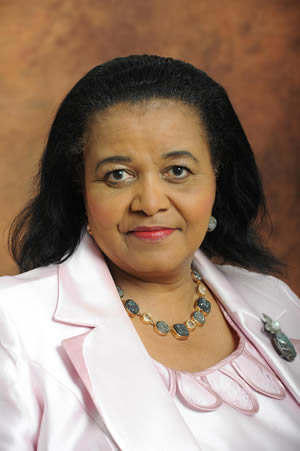 Minister Edna Bomo Molewa is the current Minister of Environmental Affairs. She has held the position since May 2014.
Minister Edna Bomo Molewa is the current Minister of Environmental Affairs. She has held the position since May 2014.
About the Minister
Minister Molewa was among the first Members of Parliament of the first democratic parliament between 1994 and 1996.
She is the first female chairperson of the Portfolio Committee on Trade and Industry.
An educator by training, Minister Molewa taught at Moloto and Mokonyane Secondary Schools from 1976 to 1981.
In 1996 Minister Molewa served as a Member of the Executive Council (MEC) for Tourism, Environment and Conservation in the North West Province, a position she held from 1996 to 1998.
From 1998 to 2000 she served as MEC for Economic Development and Tourism in the province, and as MEC for Agriculture, Conservation and Environment from 2000 to 2004.
During the same year she was appointed Premier of North West, the first woman to hold this position, which she held until 2009.
She is studying for a B.Com degree through the University of South Africa.
About the Department
The Department of Environmental Affairs is mandated to give effect to the right of citizens to an environment that is not harmful to their health or wellbeing, and to have the environment protected for the benefit of present and future generations. The department provides leadership in environmental management, conservation and protection towards sustainability for the benefit of South Africans and the global community.
Land claimants get their title deeds
Land claimants get their title deeds Estelle GreeffRural Development and Land Reform Deputy Minister Mcebisi Skwatsha and Chief Land Claims Commissioner (CLCC) Nomfundo Ntloko-Gobodo recently handed over 32 title deeds and R50 million to successful land claimants.
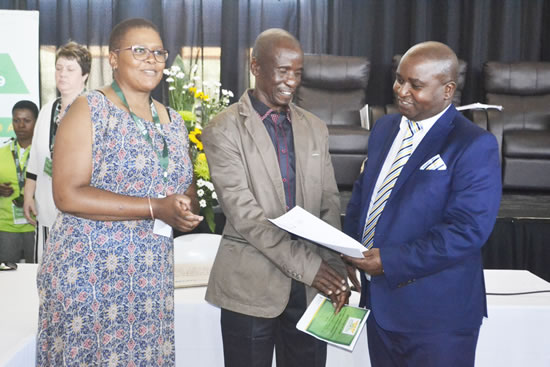 Title deeds, which were handed over in Pretoria recently, were given to the families who lost their rights to land in Onverwacht, Rustfontein, Vlakfontein, Ellison, Steynberg, and Wallmansthal. All these areas are in Gauteng.
Title deeds, which were handed over in Pretoria recently, were given to the families who lost their rights to land in Onverwacht, Rustfontein, Vlakfontein, Ellison, Steynberg, and Wallmansthal. All these areas are in Gauteng.
Four claimants from Blaauwbank, Leeufontein, Kafferskraal and Vygeboschlaagte (in Gauteng) were given financial compensation of R50 million.
“Today we are celebrating restitution in action; we are celebrating the resilience of our people. We are undoing the connotation that the restitution process is too slow,” said Deputy Minister Skwatsha.
He said part of the delay in the restitution process was due to challenges that result as it is implemented.
The restitution of land is an initiative of the department. The Restitution of Land Rights Act, passed in 1994, is the legislative framework that saw the establishment of the Commission on Restitution of Land Rights, under the leadership of the Chief Land Claims Commissioner.
Through this office, South Africans who were dispossessed of their land are given an opportunity to claim back land that was taken from them during apartheid. The process of land restitution started in 1994 and ended in 1998.
In 2014 President Jacob Zuma reopened the process to make provision for land claimants who missed the 1998 deadline.
CLCC Ntloko-Gobodo said the claimants who were honoured during the handover celebration were part of the 11 437 land claims lodged in Gauteng during the first lodgement period between 1994 and 1998. Currently, only 424 claims remain to be settled.
“We acknowledge that people have endured suffering as a result of land taken from them. The process of restoring land is complicated but it must be said that the commission is doing its work. The wheel is moving and we are restoring the dignity of our people,” she said.
The process of restitution faces some challenges such as unregistered and unsurveyed land, competing rights to land, change of names at farms, internal family fights and lack of institutional capacity that delay progress.
Claims are lodged electronically in 15 offices and six mobile offices. People have until
30 June 2019 to lodge their claims.
As of 31 December 2015, 3 310 554 hectares of land were awarded to successful restitution claimants that opted for land and over R9 billion was awarded as financial compensation.
Since the reopening of the land claims process in 2014, 133 314 claims have been lodged.
Andries Vusi Mahlangu, one of the descendants of the Leeufontein claimants, was at the event and was overjoyed that their claim was finally settled. Even more satisfying for him was that the claim was settled while his grandmother Feleni Mthimunye (98) was still alive.
“The first thing we will do as a family is erect tombstones for our ancestors, just to notify them that we got our land back,” he said.
* Themba Hleko works for the Department of Rural Development and Land Reform.
Operation Phakisa update
Operation Phakisa update nthabiPort Nolloth, Northern Cape
A new port is planned at Boegoebaai near Port Nolloth and the prefeasibility study is under way. Aquaculture projects are: abalone ranching, abalone hatchery, aquaculture facility near Hondeklipbaai and an oyster growing facility in Kleinzee.
Saldanha Bay, Western Cape
Approximately R9.2 billion in investment is planned by public and private sectors over the next five years to make this the oil and gas hub of South Africa. Work has started on the Offshore Supply Base (30 initial jobs). Aquaculture facilities, brown mussels, oysters and abalone are in production. Salmon, trout and scallops facilities. These are all experiemental.
Cape Town, Western Cape
This is one of South Africa’s major ports, with investments in fuel storage (R660 million), two offshore mining vessels (R150 million) and building of workboat ferries for the navy (approximately R23 million). A private investor has committed investment of R63.4 million for boat building infrastructure and is creating 214 direct jobs.
Mossel Bay, Western Cape
Currently, this port is undergoing the refurbishment of its slipway.
Richards Bay, KwaZulu-Natal
This port will service the oil and gas industry, ship-repair and boat-building and create secondary industries for manufacturing. An aquaculture pilot project commenced with kob farming to complement an existing fish processing facility (tuna, sword fish and line fish).
Durban, KwaZulu-Natal
Procurement of equipment such as heavy duty forklift and welding is set for the Durban Dry Dock (Shop 24). Work worth R4 million completed has been. The contract works on the Durban Dry Dock Caisson of approximately R43 million has been completed. The caission was floated on 29 January and the dry dock is open for business.
The procurement of new dock cranes as well as a new TNPA Floating Dock for Durban is on track for 2016. A private investor has committed investment of R290 million for boatbuilding infrastructure with tax incentives creating 11 direct jobs. An upgrade to the naval station into a fully-fledged naval base is planned.
East London, Eastern Cape
This is South Africa’s boat building hub and electrical and civil upgrades are underway. An aquaculture development zone within the East London Industrial Development Zone is planned.
Port of Ngqura, Eastern Cape
The deepest container terminal in sub-Saharan Africa is planned to accommodate the new generation of giant container ships traversing Africa’s southern tip. A manganese terminal will be established. An aquaculture facility is in the production phase.
Port Elizabeth, Eastern Cape
Catamarans will be built over the next five years, unlocking R1.25 billion in investment contracts and creating 500 jobs. Two bulk carriers registered on the South African Ships Register and have been flying the SA flag. An aquaculture project on abalone is in its production phase.
Did you know?
Aquaculture offers real opportunities for SMMEs
• Globally, aquaculture supplies almost 50 percent of the world’s fish. It is estimated that by 2030, the world will require an additional 50 tonnes of fish, which come mainly from aquaculture.
• To date, 10 projects are underway in the Eastern Cape, Northern Cape, Western Cape and KwaZulu-Natal with funding secured from the newly established Aquaculture Development Enhancement Programme.
• More than 500 jobs have been created and committed.
• The sector has realised private sector investment of R338 million with government investment at R106 million.
Playpump pumps water to Winterveld community
Playpump pumps water to Winterveld community Joy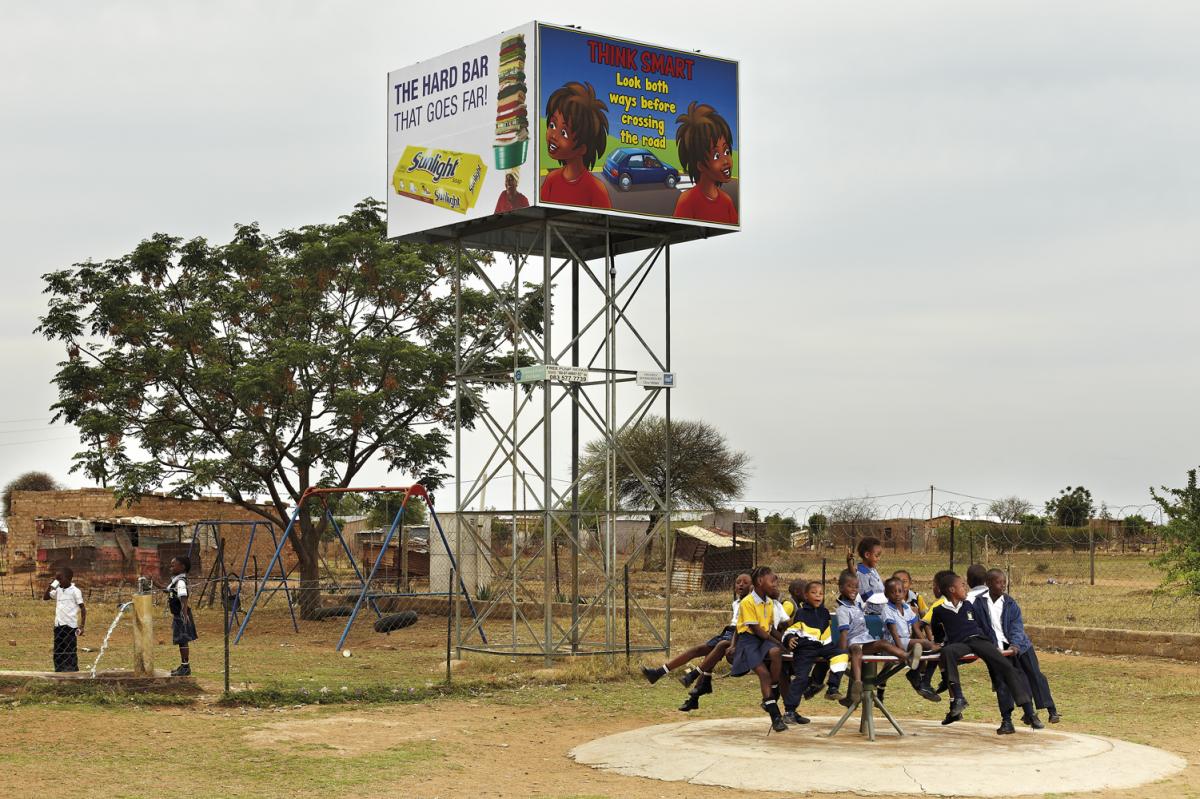 As the country battles water shortages caused by drought, people in Winterveld, Soshanguve, Pretoria, have taken matters into their own hands.
As the country battles water shortages caused by drought, people in Winterveld, Soshanguve, Pretoria, have taken matters into their own hands.
The community has come up with an innovative way of creating their own source of water from boreholes.
The water is pumped in a playful but productive way using a pumping system called a PlayPump that is powered by children playing. The children play on a
merry-go-round (playpump) on school property, which is connected to a borehole. By pushing the merry-go-round, they power the pump, which in turn pumps water from a borehole into a water tank.
Once the water reaches the tank, the community can easily access it through a communal tap at any time.
Owner of Vuma Tshepanang Day Care Centre Patricia Mahlori, who has a Playpump installed in her yard, said the initiative has been of great help to the community and has been able to alleviate the pressures of not having water available at all times due to the drought.
“We are really thankful for the project. It has helped us a lot in the past and more so now that we have been facing dry weather conditions.
“Scores of children usually come here on a daily basis after school to play on the merry-go-round and not only does this help in providing water for the community, it also keeps them off the streets and that alone makes me very happy.
“Although the government provides us with clean drinking water in our own homes, this initiative ensures that we have a constant source of water.”
Mahlori added that the initiative has brought the community together and promoted social cohesion amongst children.
“Playing on a merry-go-round has always been fun for children, so there is never a shortage of volunteers.”
Playpumps pumping water across the country
The first Playpump was installed in Kwazulu-Natal in 1996 and so far, more than 900 pumps have been installed throughout the country and provide clean drinking water to numerous communities.
Each Playpump has the capacity to generate approximately 600 to 800 litres of water per hour.
According to Director at Roundabout Water Solutions Sandra Hayes, the idea to have Playpumps was inspired by a farmer in Pretoria who used the same system at his farm.
“We initially saw this at a farm show nearby and we thought this would be great to have in schools and since our first installation, we have never looked back.
“A lot of our Playpumps are installed in primary schools where children are bound to play on the merry-go-round so we really are changing lives with this project.
“The project has been welcomed with open arms and we’ve been receiving amazing feedback over the years at the places we’ve been to,” said Hayes, who added that they receive funding from companies and individuals in the form of donations.
R210m facelift for Johannesburg roads and bridges
R210m facelift for Johannesburg roads and bridges nthabiThe City of Johannesburg is making it easier for people to travel in and around the city using world-class infrastructure.
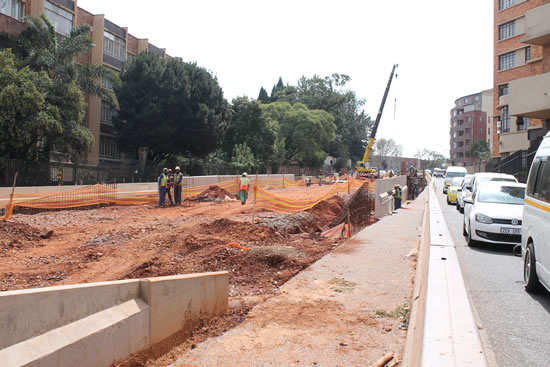 The Johannesburg Roads Agency (JRA), which falls under the City of Johannesburg, has embarked on massive construction and rehabilitation work on some roads and bridges to ensure that the city’s roads are accessible, safe and liveable.
The Johannesburg Roads Agency (JRA), which falls under the City of Johannesburg, has embarked on massive construction and rehabilitation work on some roads and bridges to ensure that the city’s roads are accessible, safe and liveable.
The R210 million Freeway Revitalisation Project, which kick-started in 2015, forms part of Johannesburg’s earmarking of more than R100 billion for strategic infrastructure over the next 10 years.
According to JRA’s Acting Managing Director Mpho Kau, the work done on the three bridges on the M1 freeway will result in short-term traffic disruptions but will have long-term benefits.
“Roads and bridges form a critical part of the transport infrastructure of a growing city and as such, their maintenance and rehabilitation is important.
“It ensures that the movement of people as well as goods and services continues effectively and efficiently and this will in turn have a positive impact on local economic growth.”
While the work on the road is causing temporary inconvenience, Kau said the long-term benefits of a world-class M1 freeway and bridge network will far outweigh the current disruptions.
“The rehabilitation phase and the end result will ensure that residents are ultimately able to travel to their destinations faster and more safely,” said Kau.
The project is expected to run until the middle of next year.
Maintenance work aligned with the project includes structural repairs, asphalt surfacing, expansion joints, drainage systems as well as erecting new road signs. The M1 section of the freeway is a key arterial route that carries approximately 80 000 private cars, commercial traffic and public transport such as taxis and buses daily.
So far, the project has created 80 job
opportunities, 50 of which have been for local labourers.
Federation and Oxford bridges are also undergoing major facelifts and certain lanes on the freeway will be closed during construction and traffic will be diverted until next year. The iconic Double Decker section of the M1 between Carr and Anderson streets will also be affected.
These routes, including Louis Botha Avenue in Parktown, are but some of the arterial routes currently receiving upgrades. Nine other bridges damaged by heavy storms and flooding last year have already been repaired.
World-class infrastructure
Meanwhile, Johannesburg’s MMC for Transport Councillor Christine Walters said a world-class city must be served by world-class infrastructure.
“The upgrades we are doing will benefit Joburgers for decades to come and ensure safe movement of people, goods and services,” said Walters.
Speaking at the launch of the project last year, City of Johannesburg Mayor Parks Tau said the infrastructure projects are in line with a holistic strategy to refurbish the city’s roads infrastructure.
“The upgrades on our roads infrastructure are part of our efforts to create a better future for our residents where we can link jobs to people and people to jobs in line with the objectives of our spatial transformation programme,” said Mayor Tau.
Plan your journey
As construction work continues to gain momentum, road-users are urged to familiarise themselves with the lane reductions, plan their journeys and to consider alternative routes.
For more information on the latest
developments on the project, visit: www.jra.org.za; Twitter:@MyJRA;
Facebook: Johannesburg Roads Agency.
SA, Middle East strengthen ties
SA, Middle East strengthen ties lebangSouth Africa and Saudi Arabia’s economic and political relations received a significant boost following a successful state visit by President Jacob Zuma to that country recently.
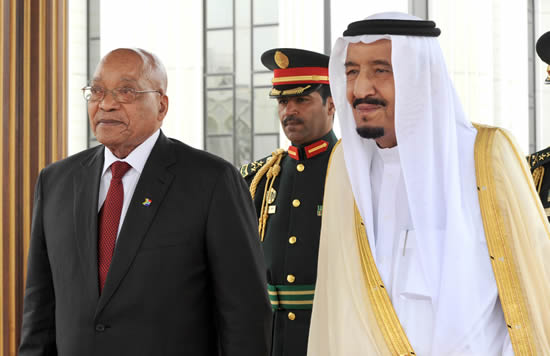 The Presidency described the visit as important for strengthening bilateral political and economic relations particularly in the areas of trade and investment.
The Presidency described the visit as important for strengthening bilateral political and economic relations particularly in the areas of trade and investment.
This, in addition to bilateral trade in targeted sectors. These include South African agricultural and agro-processed goods and services, defence procurement, manufacturing, and mineral beneficiation as well as South Africa's participation in the Saudi National Transformation Plan, especially in infrastructure development, including construction and engineering is also important.
“We are very pleased that this state visit will ensure, among other things, continued Saudi private sector investment in our country's renewable energy sector in support of the National Development Plan; the South African petrochemical sector; banking and finance; tourism infrastructure as well as Saudi participation as a maritime state in our Operation Phakisa,” President Zuma said.
First Order award
President Zuma met with Saudi King Salman bin Abdul Aziz where he was also given the First Order, the highest award the King bestows on a foreign national.
"I am very humbled to receive this rare award from His Majesty King Salman Bin Abdul Aziz on behalf of our people and our country South Africa," said President Zuma.
Business-to-business cooperation
President Zuma also addressed a high-level meeting of South Africa − Saudi Arabia business entities where he emphasised the importance of creating a platform to enhance business-to-business cooperation to increase South African exports to the Saudi market and attract Saudi investors to South Africa.
The President said he was pleased the state visit offered South Africa an opportunity to gain an overview of regional security challenges from Saudi Arabia's perspective.
"We are looking forward to the possibility of us as South Africa sharing our own experiences with regards to negotiation and reconciliation to assist in moving towards peace and security in that region," he said.
The two countries have agreed to work to ensure closer bilateral intelligence cooperation, in particular in relation to the regional terrorism threat to domestic and regional security and stability.
South Africa and Saudi Arabia will also promote the stabilisation efforts of South Africa's Middle East Peace Process (MEPP) Special Envoys in support of international efforts to find a lasting solution to the Palestine − Israeli conflict.
Working visit to the UAE
President Zuma’s mission also went to Dubai in the United Arab Emirates (UAE) for a working visit.
The President met Prime Minister Sheikh Mohamed bin Rashid Al Maktoum, followed by an interaction with the UAE business community prime minister, as well as several business leaders.
The aim of the visit to the UAE was to strengthen political and economic relations which exist between the respective countries in particular in the commercial, trade and investment sectors, as well as people-to-people and cultural interaction.
The UAE is one of the most developed countries in the world with the best infrastructure.
The two countries enjoy a strong bond of friendship and strategic bilateral relations characterised by the exchange of several high-level visits, a high-level of trade and economic interaction, multiple daily flights between the UAE and three South African cities and a large South African expatriate community in the UAE.
SA’s ocean economy unlocks billions
SA’s ocean economy unlocks billions JoyMore than R17 billion has been unlocked in the economy and a further 4 500 jobs have been created since the launch of Operation Phakisa: Oceans Economy less than two years ago.
President Jacob Zuma said this during a recent visit to the Port of Port Elizabeth.
The President visited the port to monitor the economic activity taking place and report back on the progress made since the launch of Operation Phakisa: Oceans Economy.
Operation Phakisa (meaning “hurry up” in Sesotho) is a government programme designed to fast track the implementation of solutions on critical development issues. Through Operation Phakisa, government aims to implement priority programmes better, faster and more effectively.
South Africa is targeting the oceans economy, as it is one of the key drivers in the Nine-Point Plan to grow and transform the economy, create jobs and attract investment.
President Zuma said government had learned good lessons in implementing Operation Phakisa: Oceans Economy and unlocking private sector investment.
“Where government has made interventions, whether within the policy space or facilitating authorisations and approvals or providing some incentives, it has unlocked private sector investment,” he said.
The President added that government would continue to work hand-in-hand with the private sector and all its partners and stakeholders to ensure that there were more investments.
Within the last year and a half, Operation Phakisa’s main focus had been on implementing plans to clear constraints and blockages hampering the development of these projects, he said.
“Operation Phakisa will also be used to develop rural economies. This we will do through small harbour development, coastal and marine tourism and aquaculture which is the fish industry,” said President Zuma.
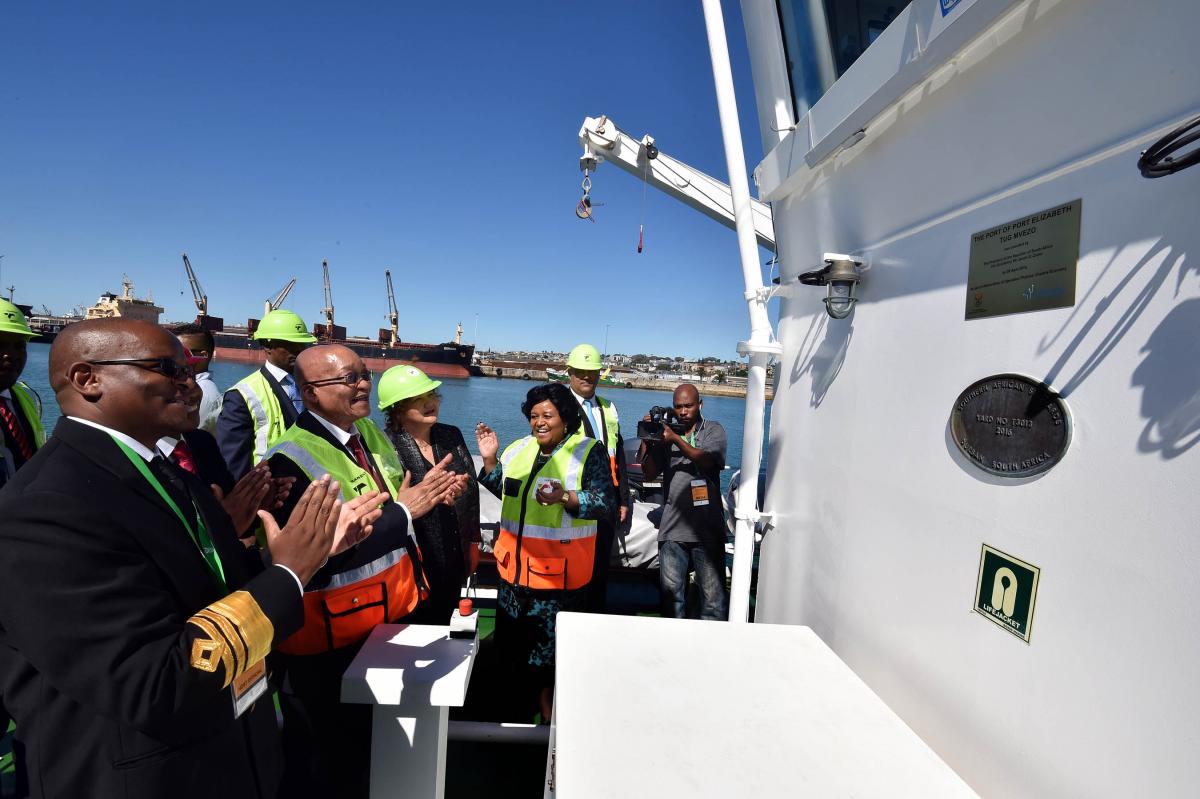
Rehabilitating harbours
An amount of R80 million had been allocated for the rehabilitation and maintenance of proclaimed fishing harbours in Gansbaai, Saldanha Bay, Struisbaai, Gordons Bay and Lamberts Bay in the Western Cape.
The establishment of three new harbours in the Northern Cape, Eastern Cape and KwaZulu-Natal would also provide opportunities for local and rural economic development.
In the aquaculture sector, more than
R400 million worth of investments, both from the private sector and government, have been committed across 10 aquaculture farms in the Eastern Cape, KwaZulu-Natal, Western Cape and Northern Cape.
President Zuma also announced the launch of the South African International Marine Institute to be based at the Nelson Mandela Metropolitan Municipality.
The initiative aims to develop the skills and knowledge base required to ensure the success of “Blue Economy” maritime economic development for Operation Phakisa and the African Union’s African Integrated Maritime Strategy.
During the visit, the President was taken to the re-constructed slipway and lead-in jetties within the Port of Port Elizabeth. An investment of R307 million is being channelled towards the refurbishment of the port and work is underway to attract new investments.
The refurbished slipway will be able to accommodate more vessels. When the development is complete, at least 12 vessels will be accommodated for hull inspection and maintenance as compared to the current two.
President Zuma mentioned that South Africa is also making progress in the boat building sector. He said R353 million had already been committed in the ports of Durban and Cape Town for boatbuilding infrastructure, and this initiative had created approximately 355 direct jobs.
President Zuma also unveiled a plaque at the newly-acquired boat hoist of Port Elizabeth. It is the second of its kind in the country.
"This boat hoist has a 90 ton capacity and forms part of the construction of a new slipway. This will ensure that the industry is assisted more efficiently than in the past,” said the President.
Sport facilities for SA youth
Sport facilities for SA youth lebangMunicipalities across the country will benefit from a partnership between the South African Local Government Association (SALGA) and The Sports Trust.
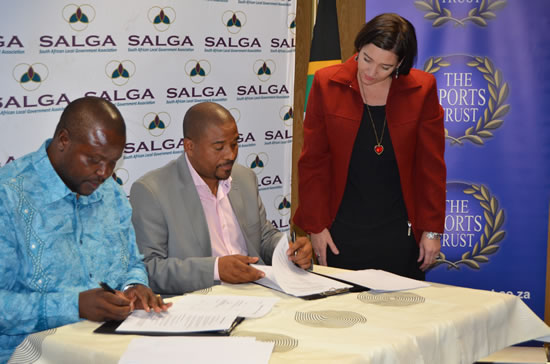 The Sports Trust will identify the needs for sports facilities and will act as an implementing agent for all joint sports projects in municipalities to ensure the highest return on investment.
The Sports Trust will identify the needs for sports facilities and will act as an implementing agent for all joint sports projects in municipalities to ensure the highest return on investment.
SALGA represents local government and is mandated to transform local government to enable it to fulfil its developmental role. The Sports Trust has expertise in the field of sports and recreation and plays a role in the development of sport facilities and provision of related sporting equipment and kit.
Chief Executive Officer of SALGA Xolile George said the sports facilities will help local government to fulfil its developmental role.
Chairman of the Board of Trustees at The Sports Trust Jackie Mathebula said the partnership will assist municipalities to unearth hidden talents, especially in rural areas.
“The bigger goal is to ensure that those children and the youth that have got potential and talent to participate in any sporting code will have access to facilities, kit and coaches and we hope they will excel in those sporting codes.
“We need to ensure that all the youth across all corners of South Africa have access to world-class sporting facilities,” said Mathebula.
The facilities that will be built are multipurpose courts that can accommodate various sports codes.
“These facilities have a durability period of 20 years and they will cater for various sports codes such as football, tennis, netball, volleyball and can also be used as an exercise field.”
Currently, multipurpose courts have been installed in different schools across the country.
One major aspect of the courts is that they are maintenance free.
“All that you have to do is make sure that the grass is cut and does not grow onto the playing surface,” added Mathebula.
Stop sexual harassment in the workplace
Stop sexual harassment in the workplace Estelle GreeffSouth Africa is cracking the whip on sexual harassment and officials have urged victims of workplace harassment to come forward and report incidents.
 More often than not, victims of harassment are unaware of the crime that has been committed against them, while some are scared and even embarrassed to come forward to place a formal complaint.
More often than not, victims of harassment are unaware of the crime that has been committed against them, while some are scared and even embarrassed to come forward to place a formal complaint.
What is sexual harassment?
Sexual harassment in the workplace is any unwanted attention of a sexual nature that takes place in the work environment that causes mental, psychological, physical or economic harm to another person.
This is any kind of sexual behaviour that makes you feel uncomfortable, including:
- Touching
- Unwelcome sexual jokes
- Unwarranted questions about your sex life
- Whistling
- Rude gestures
- Requests for sex
- Staring at your body in an offensive way.
What to do if you are sexually harassed?
If you are a victim of sexual harassment you can deal with it in an informal or formal way.
Informal way
This is when you try to sort out the problem without taking up a grievance (formal workplace complaint) against the abuser.
Ways of taking informal action:
- Talk to the abuser and ask him/her to stop the behaviour that makes you feel uncomfortable.
- If you feel uncomfortable about being alone with the abuser, you can ask someone that you trust to come with you when you talk to the abuser.
- Ask someone else to speak to the abuser. You can ask your shop steward or a work colleague to do this for you.
Formal way
- Where a formal procedure has been chosen by the aggrieved, a formal procedure for resolving the grievance should be available and should:
- Specify to whom the employee should lodge the grievance.
- Make reference to timeframes which allow the grievance to be dealt with expeditiously.
- Provide that if the case is not resolved satisfactorily, the issue can be dealt with in terms of the dispute procedures contained in item 7(7) of the Code of Good Practice on Sexual Harassment.
Sexual harassment and the law
Prior to 2011, the civil and criminal law framework did not provide adequate recourse to victims of harassment who are not in a domestic relationship.
This meant that only victims of harassment in a domestic partnership could come forward. The Domestic Violence Act, 1998, provides only for a remedy against harassment and stalking in a domestic relationship.
To address the problem of non-domestic harassment, the Protection from Harassment Act, 2011 (Act 17 of 2011) was introduced to protect everyone against harassment.
The Act provides help to victims, in the form of a protection order, which bans a person from harassing another person.
“If the harasser breaches a protection order he or she commits an offence which is punishable with a fine or a period of imprisonment,” explains Sarel Robbertse, a state law advisor at the Department of Justice and Constitutional Development.
A complainant is a person who has allegedly been the victim of harassment and is bringing forward a claim.
Robbertse also explained that the Act states that a child under the age of 18, or a person on behalf of a child, may apply for a protection order. This can be done without the assistance of the child’s parents or guardian.
The Act also makes provision for sexual harassment, which relates to “any unwelcomed sexual attention from a person who reasonably knows that such attention is unwelcomed”.
Such sexual attention includes unwelcomedbehaviour, suggestions, messages or remarks of a sexual nature that offend, intimidate or humiliate a complainant or a person who has a close relationship with the complainant.
Sexual harassment victim gets help
A former victim of sexual harassment, Claire Browns from Upington, Northern Cape, filed a protection order after alleging that a male colleague was sexually harassing her.
“My colleague made remarks towards me of a sexual nature that made me feel uncomfortable,” she highlighted.
Browns laid a formal complaint of harassment and filed a protection order.
The Protection from Harassment Act also provides for a mechanism to assist in finding out the identity and address of a harasser who uses electronic communications to harass victims.
The court may direct an electronic communications service provider to supply the court with the name, surname, identity number and address of the cyber harasser; and any other available information that will validate the harassment of the complainant.
Sinenhlanhla Mkhwanazi works for the Department of Justice and Constinutional Development.
*Additional information from: www.mywage.co.za
Take care of your kidneys
Take care of your kidneys nthabiChronic kidney disease is a silent killer that continues to take thousands of lives across the world.
The number of people who need to be treated for kidney disease continues to increase and this puts added pressure on an already overburdened health system.
To enjoy a healthy life and to avoid kidney disease you must take good care of your kidneys.
For more information on
haemodialysis treatment call:
Northern Cape
Kimberley Provincial Hospital
053 802 9111
North West
Klerksdorp Hospital
018 406 4600
Job Shimankane Tibane
hospital - 014 590 5100
Mafikeng Provincial Hospital
018 383 2005
Free State
Universitas hospital - 051 506 3500
Eastern Cape
East London Hospital
043 709 1111
Livingston Hospital
041 405 9111
Western Cape
Tygerburg Hospital - 021 938 4785/6
or 021 938 6595/6
Red Cross War Memorial Childrenís hospital - 021 658 5111
Groote Schuur Hospital
021 404 9111
KwaZulu-Natal
Inkosi Albert Luthuli Hospital
031 240 1911
Gauteng
Charlotte Maxeke Hospital - 011 488 4911
George Mukhari Hospital - 012 529 3111
Steve Biko Academic Hospital
012 354 1702
Mpumalanga
Rob Ferreira Hospital - 013 741 6100
Witbank Hospital - 013 653 2000
Limpopo
Polokwane Provincial Hospital
015 287 5000
Technology improves teaching in Free State
Technology improves teaching in Free State JoyOver 70 schools in the Free State have replaced the old teaching method of using a chalkboard and textbooks with technology and other new forms of teaching.
The Internet Broadcast Project is a partnership between the University of Free State and the provincial Department of Education that involves the university providing daily interactive curriculum-focused support across the province, even in most rural areas.
This is done by broadcasting daily lessons that cover a curriculum of certain subjects at 71 centres. Teachers at the 71 schools connect to the Internet and a teacher from the university gives tutorials online to all the connected schools, focusing on a specific subject.
The lessons are taught live from one of the university’s studios and are directed at both the training of teachers and teaching of learners. The lessons are in Economics, Geography, Physics, Mathematics and English.
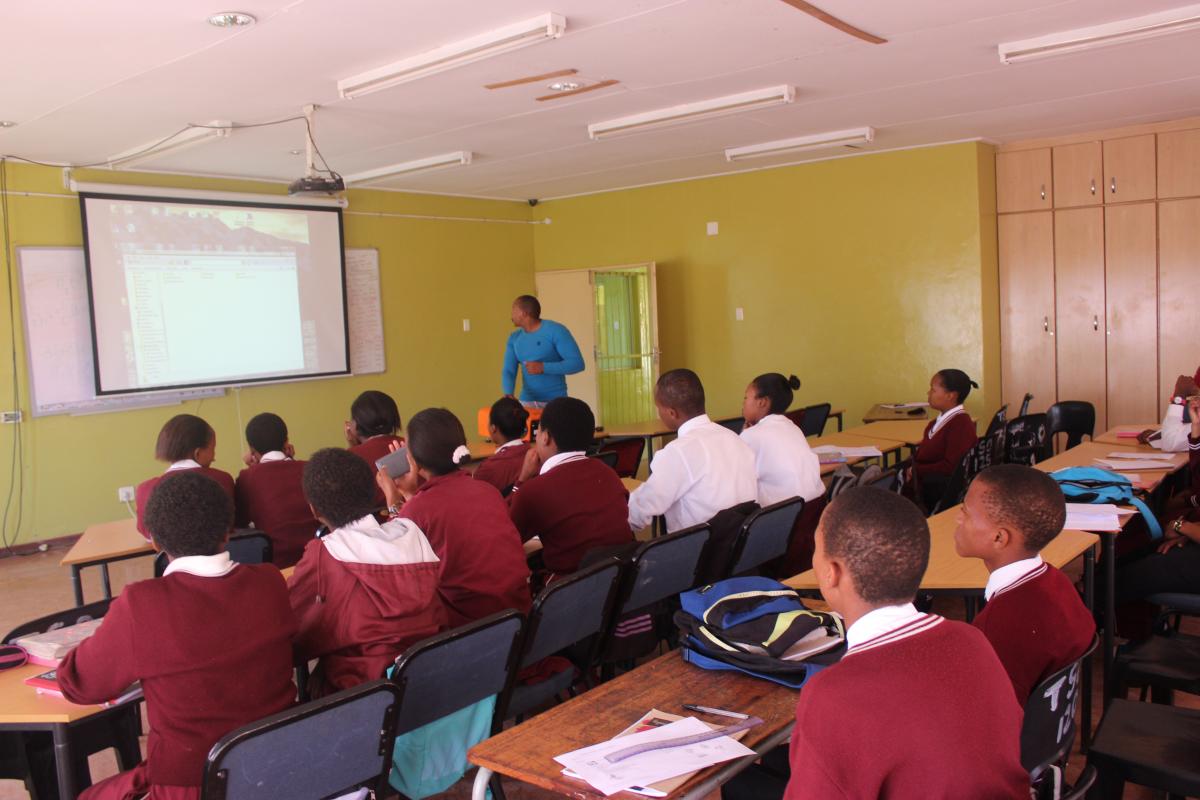 The partnership aims to achieve two main goals. The first is to bring equal, quality education through teachers who are experts in their field and will teach learners regardless of their socio-economic status or geographical location.
The partnership aims to achieve two main goals. The first is to bring equal, quality education through teachers who are experts in their field and will teach learners regardless of their socio-economic status or geographical location.
The second is to deliver cost-effective continuous, effective teacher development directly relevant to the community.
One of the schools that has benefitted from this partnership is Tsoseletso High School outside Bloemfontein.
Acting principal Michael Litabe said given the digital era that we are living in, the introduction of e-learning in schools was inevitable.
“We need to move away from those old methods and introduce technology so we can attract the attention of the learners, because they are techno savvy.
“When you introduce technology, you are playing into a field that they are comfortable with and a field that interests them.”
English teacher Kamohelo Mongwenyane agrees, saying that both the teachers and the learners are enjoying their lessons.
Litabe said learners are now participating more in lessons and their concentration has increased.
“The number of learners who stay away from school has also declined and we are now seeing 100 percent attendance,” he said proudly.
Over the past six years, the school’s matric results have always been over 80 percent – apart from 2011 when a 78.2 percent pass rate was achieved.
In 2010, the pass rate was 84.6 percent, 82.2 percent in 2012, 85.4 percent in 2013, 92.5 percent in 2014 and in 2015, the school achieved an 82.5 percent pass rate.
Litabe added that with the introduction of technology, he is hopeful that the school will be able to achieve a 100 percent pass rate.
Update your child maintenance files
Update your child maintenance files Estelle GreeffIf you live in Gauteng or the Northern Cape and you are paying or receiving child maintenance monies, you need to update your personal information.
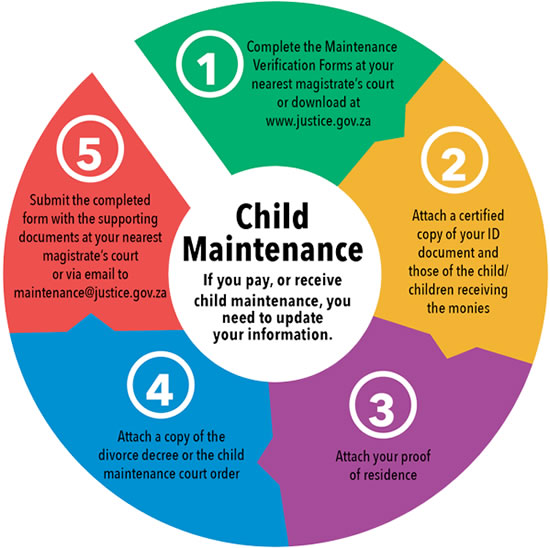 The Department of Justice and Constitutional Development started the information verification drive to support the updating of maintenance files, which form the bulk of the Third Party Funds (TPF) payments.
The Department of Justice and Constitutional Development started the information verification drive to support the updating of maintenance files, which form the bulk of the Third Party Funds (TPF) payments.
By updating your information at the courts child maintenance payments can be made faster and smarter.
Updated files will include the full information of beneficiaries and obligors, together with supporting documents.
The information verification drive will also support the efforts of the department towards a clean audit on TPF.
What will happen during the information verification drive?
- The pilot information verification drive is taking place in Gauteng and the Northern Cape.
- The department will run radio and newspaper adverts which call on the public to supply their information and supporting documents.
- Court staff must be ready to receive the information from members of the public that will allow their files to be updated.
- It should be noted that the forms that must be filled by members of the public can either be completed in hard copy, or by email. The forms can be found on DJINI and the departmental website: www.justice.gov.za.
- The email address for submission by members of the public is: Maintenance@justice.gov.za.
- Please ensure that all forms received contain the following supporting documents:
- Certified copy of an ID and those of the child receiving monies.
- Proof of residence.
- Copy of the divorce decree or child maintenance order.
The closing date for the Gauteng andNorthern Cape pilot is 31 May 2016.
For queries or inputs, please contact: Mojamail@justice.gov.za
If, as an employee of the department, you are paying or receiving child maintenance monies, and you live in Gauteng or Northern Cape, you must download the forms and submit them with completed supporting documentation via email to: Maintenance@justice.gov.za.
Water storage facilities for KZN communities
Water storage facilities for KZN communities nthabiAs the country experiences the effects of drought, government is rolling out plans to help those who have been worst affected.
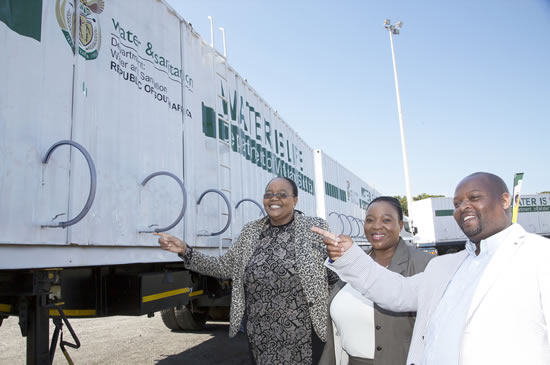 The KwaZulu-Natal (KZN) Cooperative Governance and Traditional Affairs (Cogta) MEC Nomusa Dube-Ncube in partnership with the Department of Water and Sanitation recently handed over four converted water storage facilities to the hardest hit KZN municipalities.
The KwaZulu-Natal (KZN) Cooperative Governance and Traditional Affairs (Cogta) MEC Nomusa Dube-Ncube in partnership with the Department of Water and Sanitation recently handed over four converted water storage facilities to the hardest hit KZN municipalities.
Speaking at the handover ceremony, MEC Dube-Ncube said government believes that actions speak louder than words and her department was supplementing its drought awareness campaign with interventions aimed at mitigating the impact of the current drought.
“This handover is not an isolated event. Over the past year, the KZN Cogta has bought more than 53 motorised water tankers for various districts, drilled more than 150 boreholes and refurbished 85 others back into operation.
“Our interventions are changing people’s lives in real time. They are also building our resilience as a province in the face of future droughts which are fast becoming a fact of life as a result of climate change,” said MEC Dube-Ncube.
The four converted water tankers are made of stainless steel and each have a capacity of 80 000 litres. Each will be able to supply water to 2 000 people per week. The four recipients of these facilities are Abaqulusi, Mthonjaneni, KwaDukuza and Maphumulo local municipalities. KwaDukuza Municipal Mayor Ricardo Mthembu said the water tanks would bring much-needed relief to the area.
“This is really a long-term drought management plan for us. Before we had mobile water tanks for easy transportation of water to needy communities, but the problem with those tanks is that there were small. The truck had to go to one community five or six times a day and by the time they were ready to move to another community, it would already be dark. The big tanks are going to help a lot and they are going to save time,” he said.
One of the residents from KwaDukuza, Mzonjani Hlongwa, said the community was grateful for the water tanks.
“Drought has caused so much devastation among our community. This year we didn’t plant anything because of water shortages; our livestock is dying because there is no food and water,” he said.
MEC Dube-Ncube urged the community to look after the water tanks and maintain them so they will last and serve as many communities as possible.
“These tanks now belong to you. Please safeguard them and report to councillors any form of vandalism,” she said.
What you need to know about organ donation
What you need to know about organ donation nthabiMany people don't know that by donating an organ after death they could save more than one life.
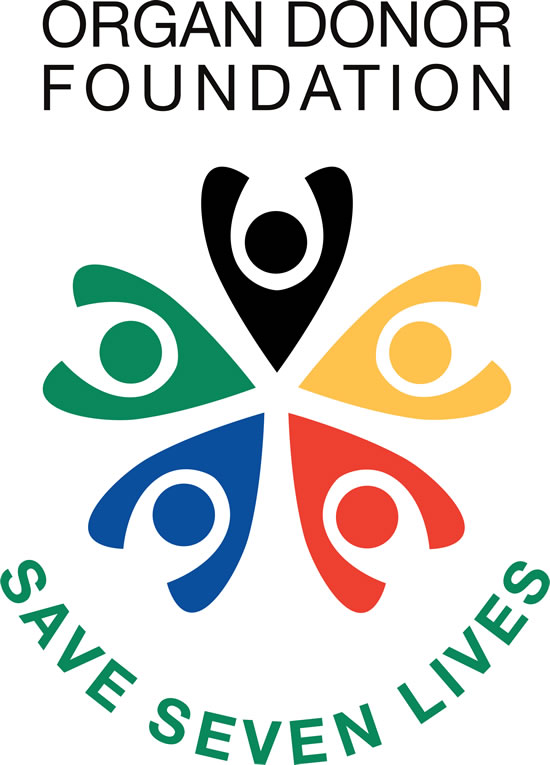 There are thousands of people who are waiting for someone to donate an organ in order to stay alive or live normal lives.
There are thousands of people who are waiting for someone to donate an organ in order to stay alive or live normal lives.
Organisations such as the Organ Donation Foundation provide communities with assistance and knowledge about organ donation and the urgent need for people to register as organ donors.
Emlynn Roynie from the Organ Donor Foundation said there are currently over 4 300 adults and children awaiting organ and cornea transplants in South Africa.
“Tragically, less than 600 of these people will receive a transplant and a second chance at life due to this critical shortage. We urge everyone to register and be the solution to this tragic statistic,” said Roynie.
Any person who is in good health and is clear of chronic diseases that might affect the recipient will be considered as a possible donor.
Organs such as the heart, liver, and pancreas can save three lives, while the kidneys and lungs can help another four people.
There is no cost to donate organs and family members do not pay for any medical cost related to organ donation.
How do I become an organ / tissue donor?
If you would like to become an organ donor call the Organ Donor
Foundation toll free on: 0800 22 66 11, or register online at
www.odf.org.za
Always carry an Organ Donor Card in your wallet and place an Organ Donor Sticker on your ID document and on your driverís license. It is important for your family to be aware of your wish as WITHOUT their consent your organs/tissue cannot be donated.
Young promoter wants to grow boxing
Young promoter wants to grow boxing lebangDetermination and passion are key factors that have contributed to the success of Tumelo Pedi in realising and achieving his goals.
 When Pedi began his career as an amateur boxer in 2012 under the mentorship of trainer Allan Toweel, he had many hopes and dreams about his future in the boxing industry.
When Pedi began his career as an amateur boxer in 2012 under the mentorship of trainer Allan Toweel, he had many hopes and dreams about his future in the boxing industry.
This was however short-lived when he fought against Rofhiwa “War Chila”Maemu in the 2015 Gauteng Featherweight Championship where he sustained a head injury. This led to his untimely retirement as a professional boxer.
The ever resilient Pedi did not let his injury get in the way of his passion and love for boxing. In February 2016, Pedi (now 23) received a promoting license from Boxing SA, making him the youngest boxing promoter in South Africa.
A boxing promoter’s work involves setting up and promoting boxing matches and fights between different boxers. Usually a promoter is responsible for finding talented boxers, signing them up for a fight, finding the venue for the fight, marketing the fight, and ensuring that people attend the event.
Pedi never imagined that he would eventually start his own promotions company TwoShots. His company is dedicated to the revival and growth of boxing in South Africa.
In an interview with Vuk’uzenzele Pedi cited his excitement about the development of boxing in South Africa. He further indicated that South Africa has good fighters and good trainers but lacks enough promoters which is something he hopes to change going forward.
“I know a lot about boxing, I have been a fighter and would like to see top fighters getting an opportunity to fight and go somewhere in their careers,” said Pedi.
Pedi recently hosted his first boxing tournament at the Walter Sisulu Hall in Randburg, Johannesburg, which headlined former rivals Rofhiwa Maemu and Katiso Hlahane.
“SA has a lot of boxing talent and I’m really looking forward to the development and growth of professional boxing in the country,” said Pedi.